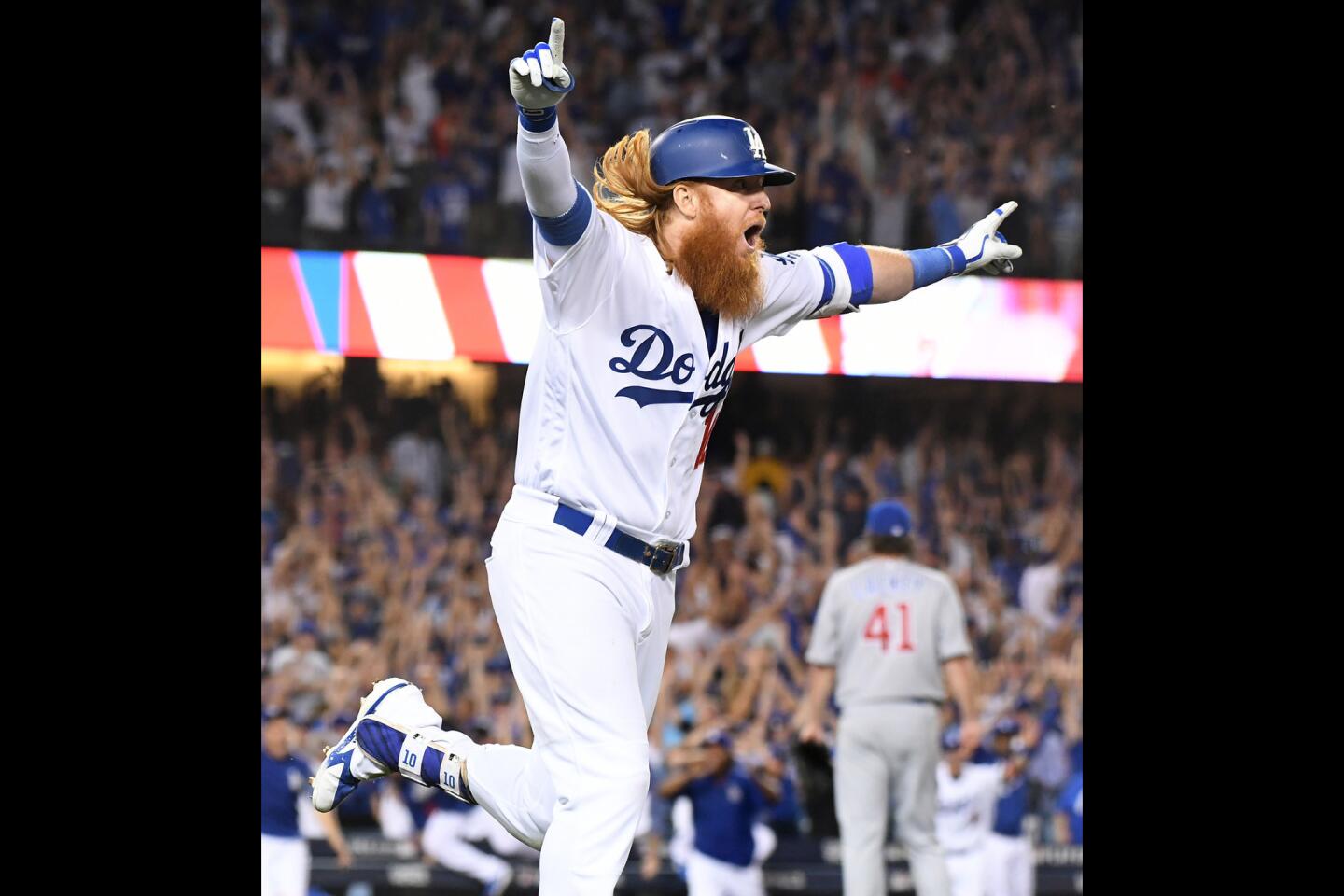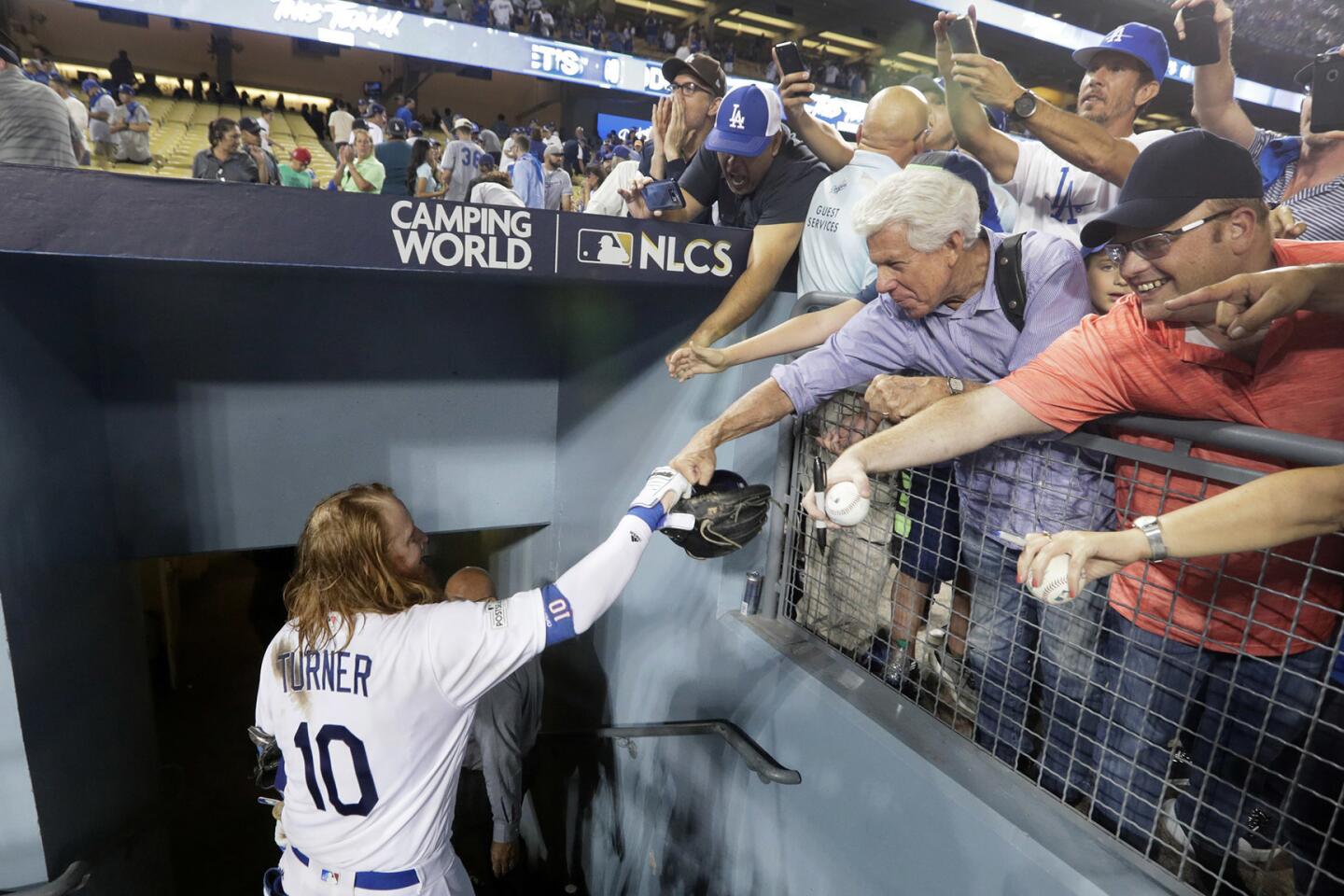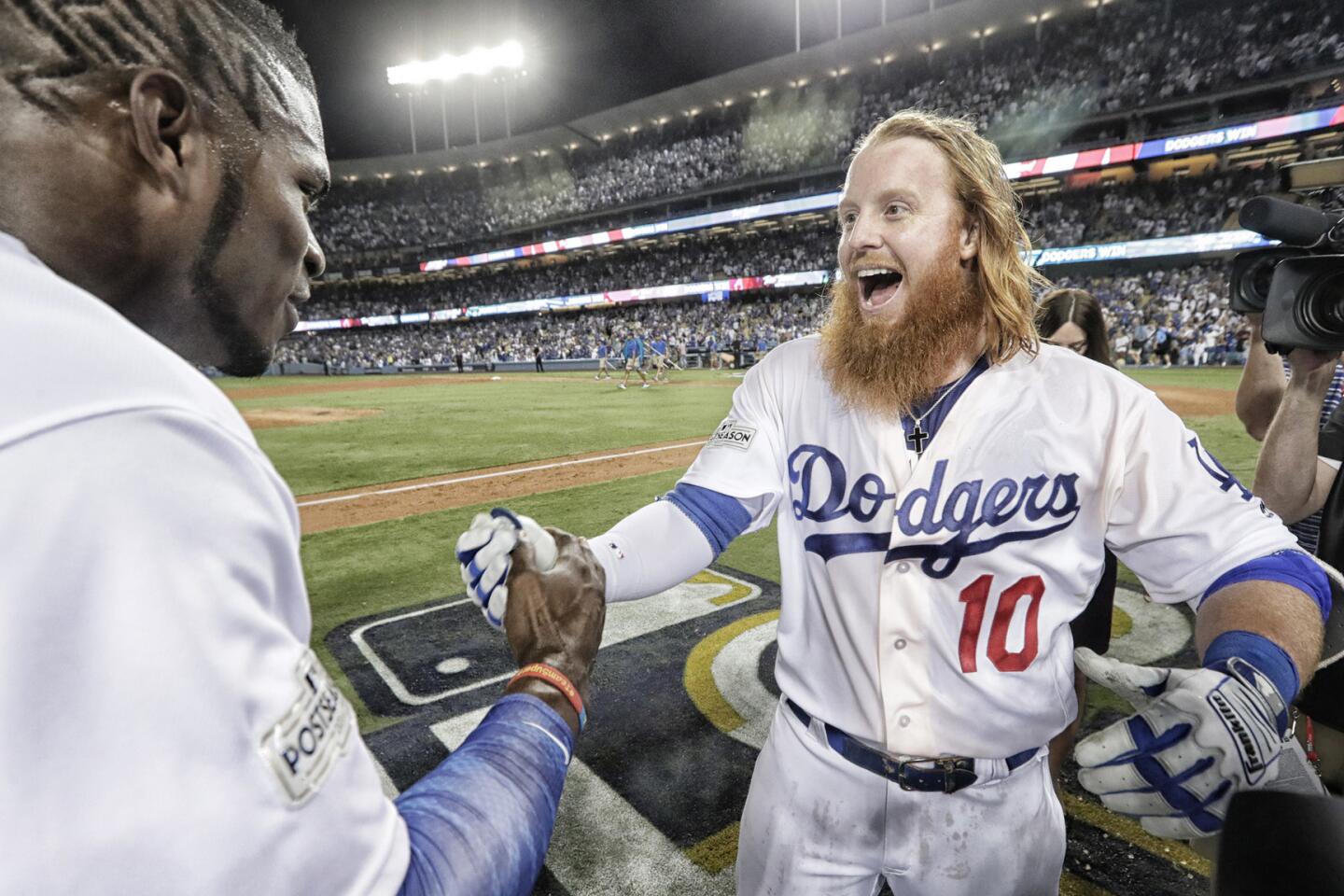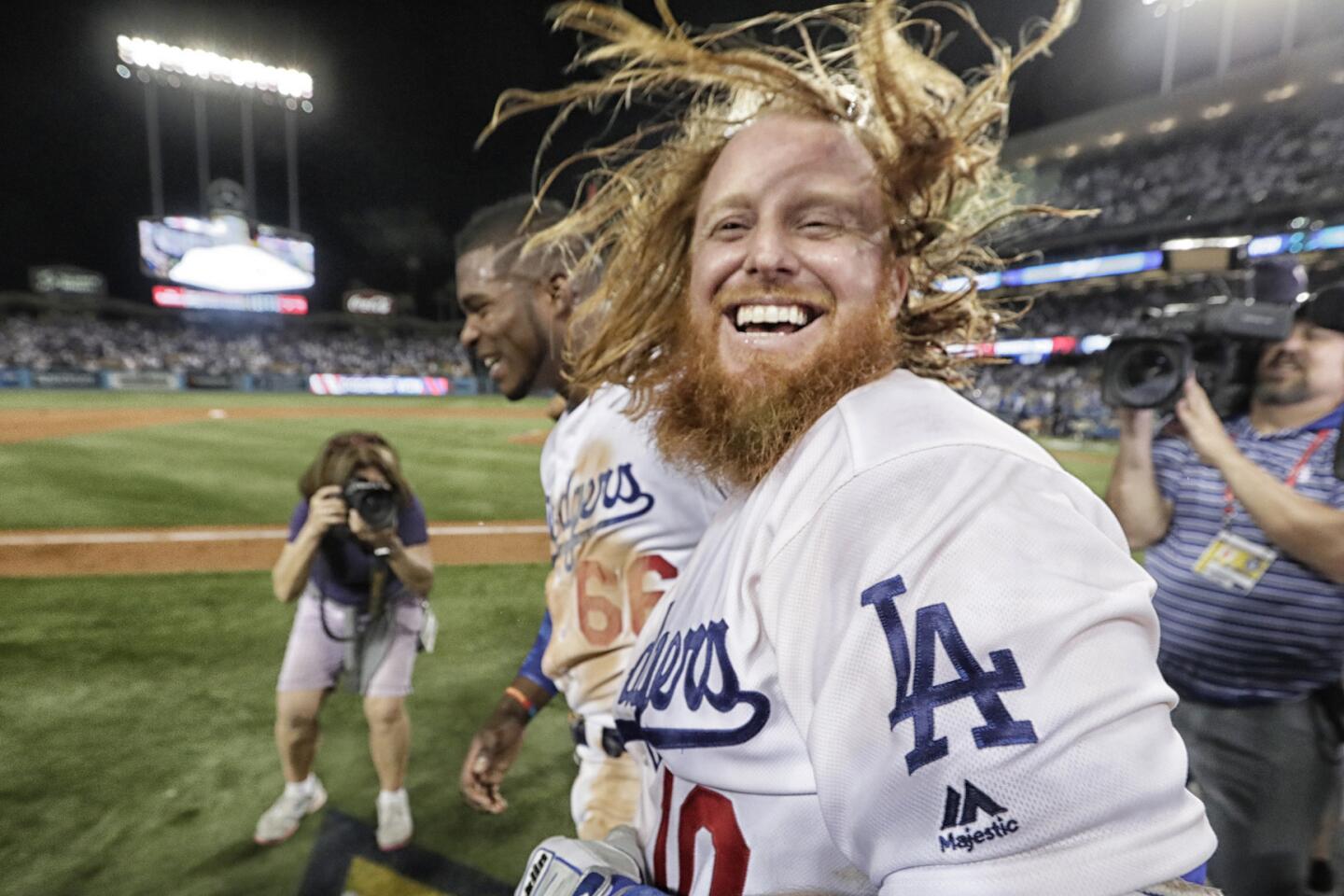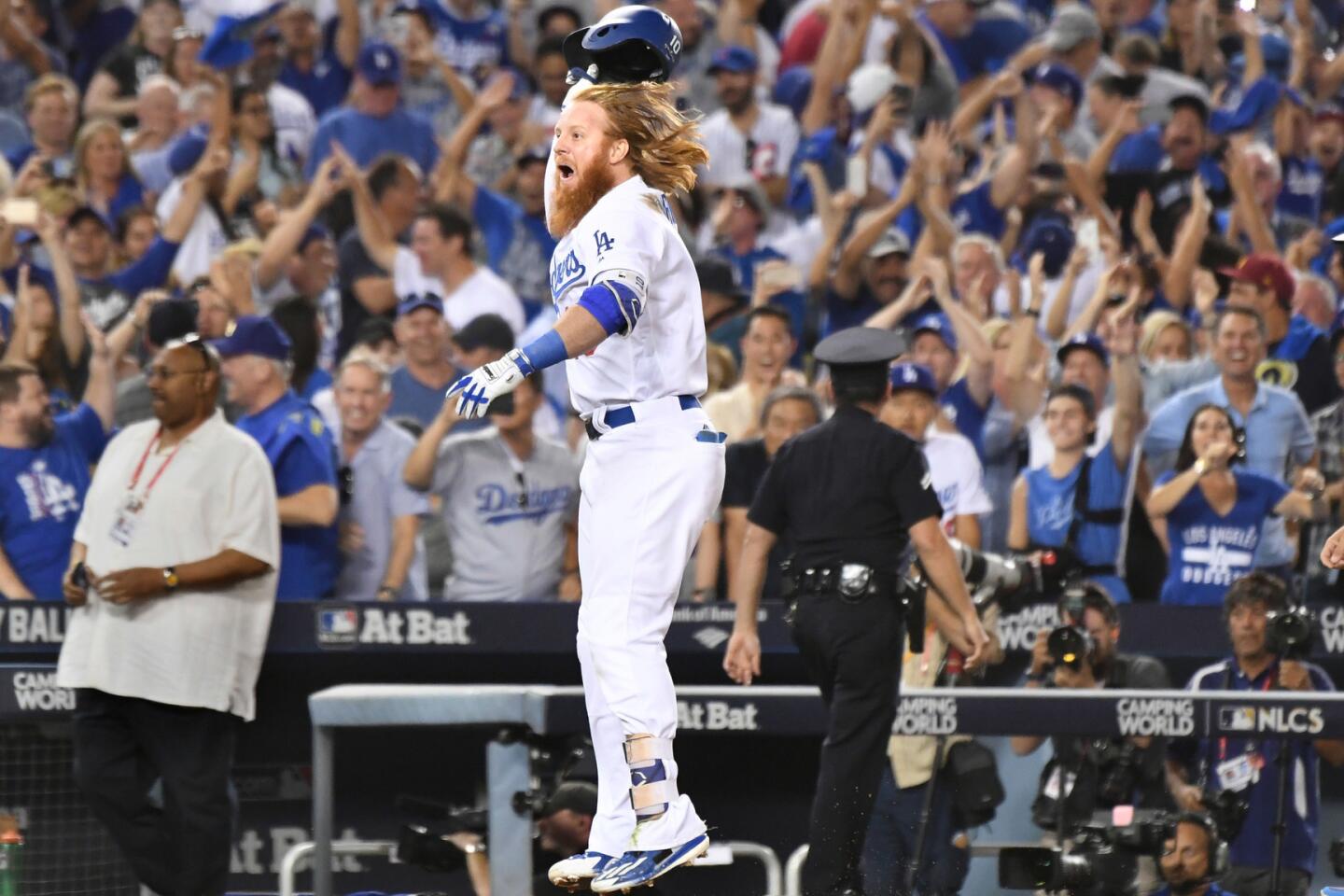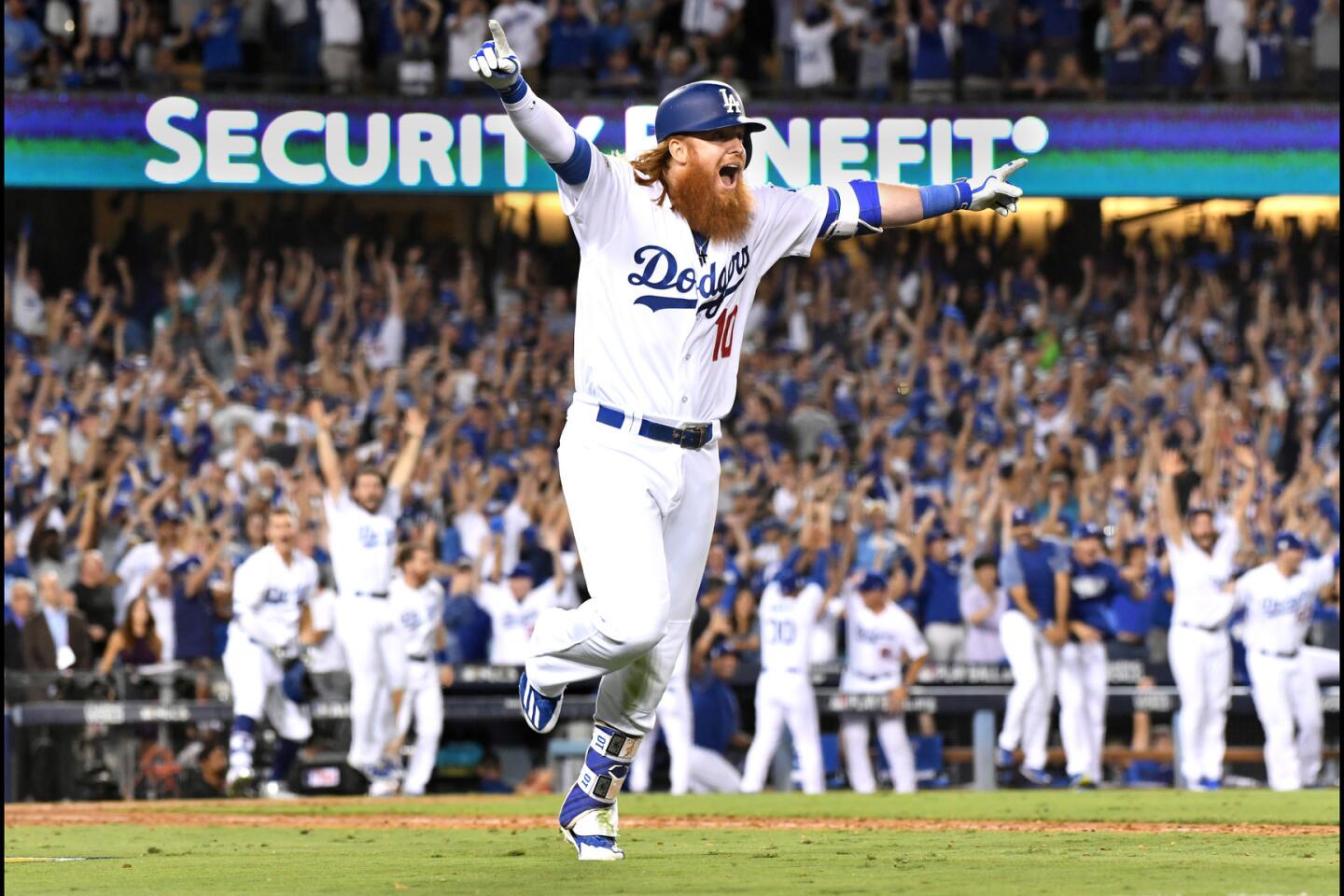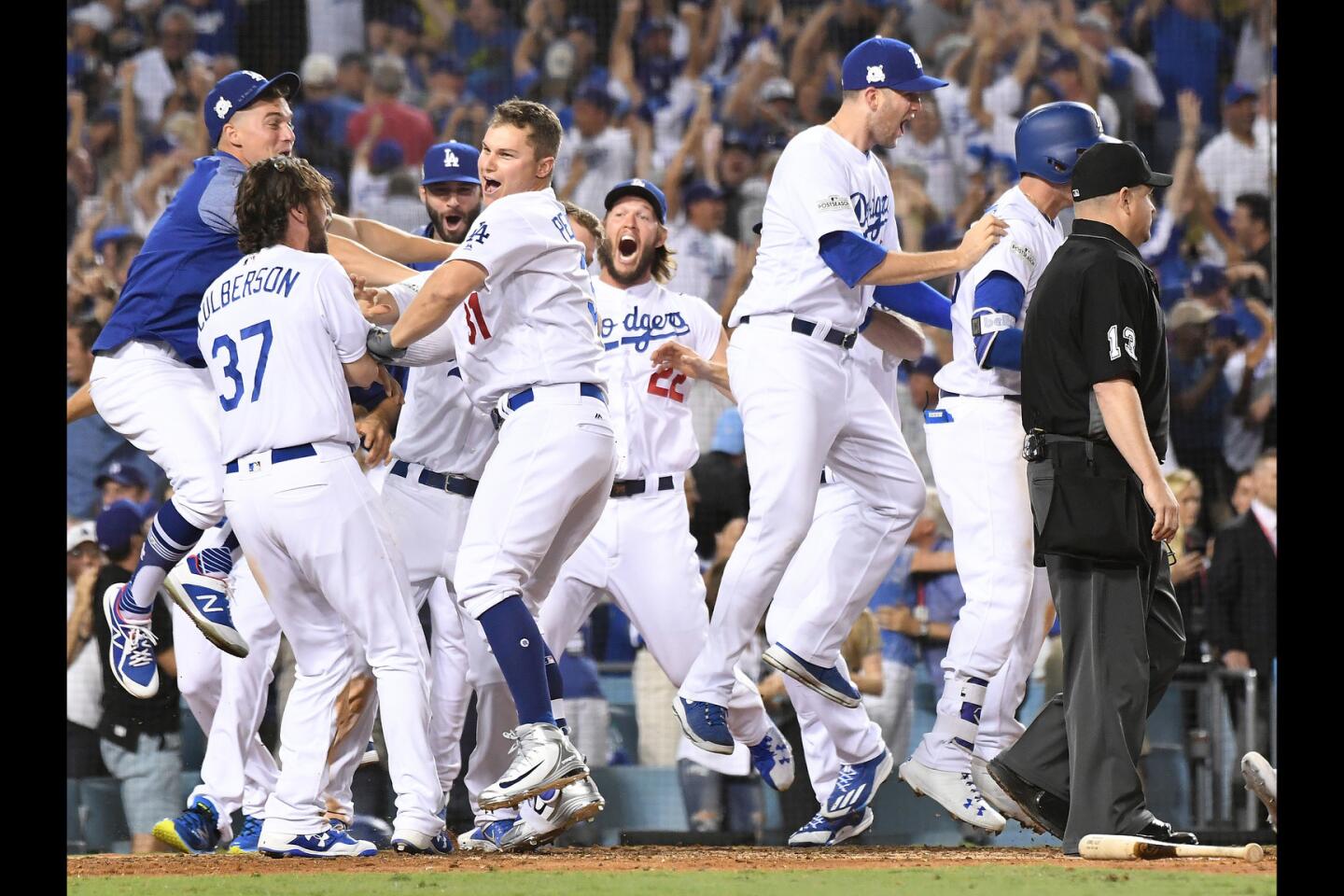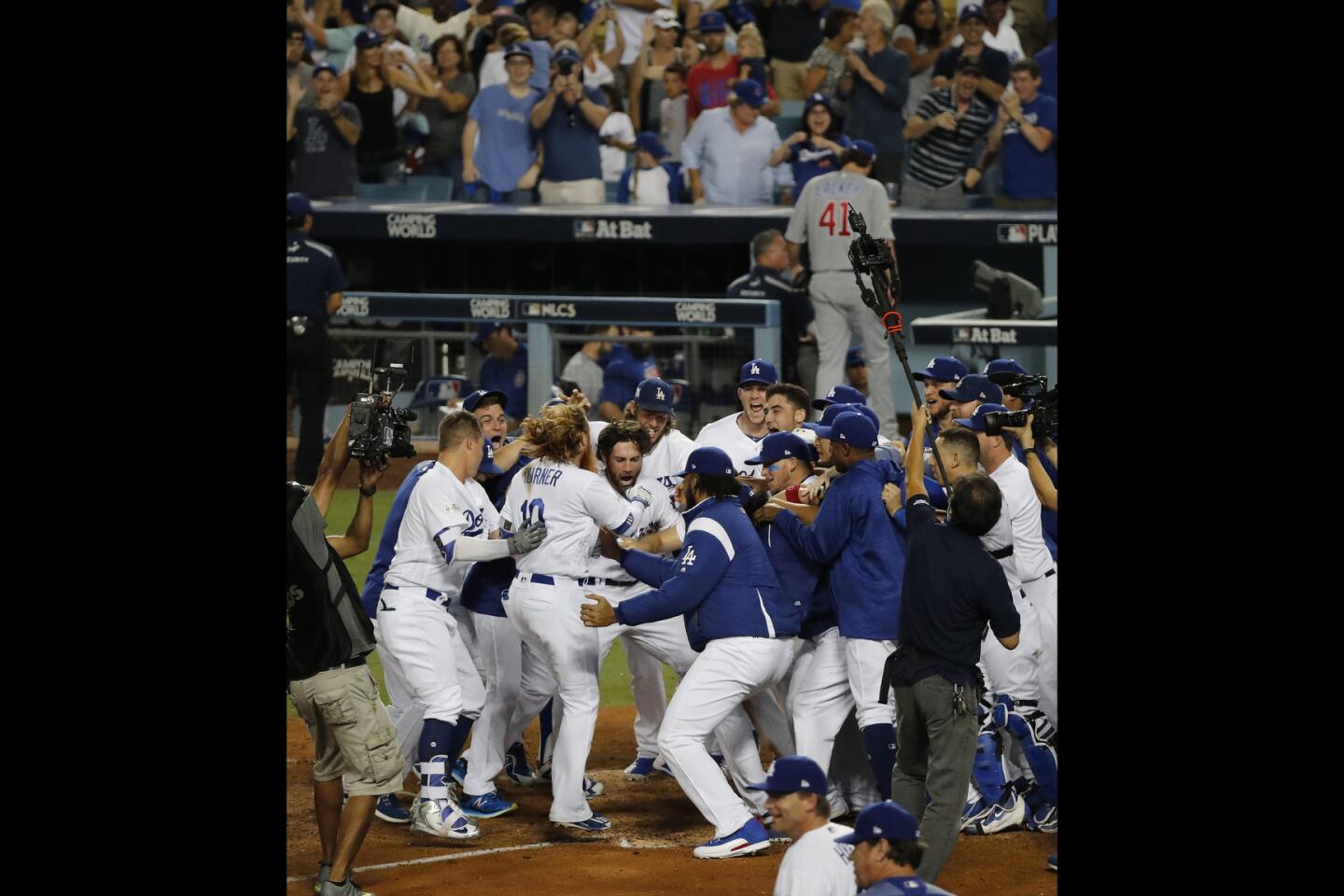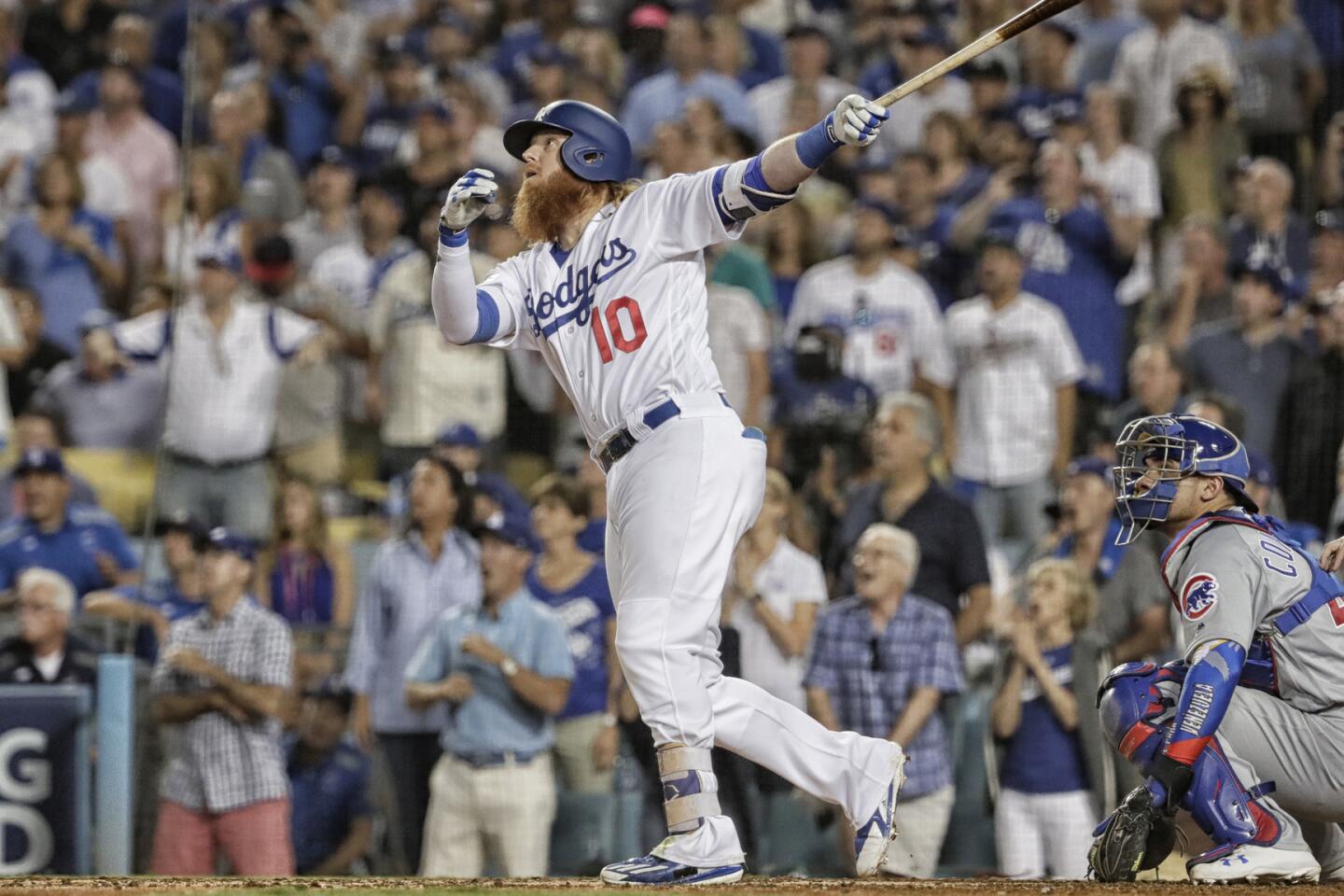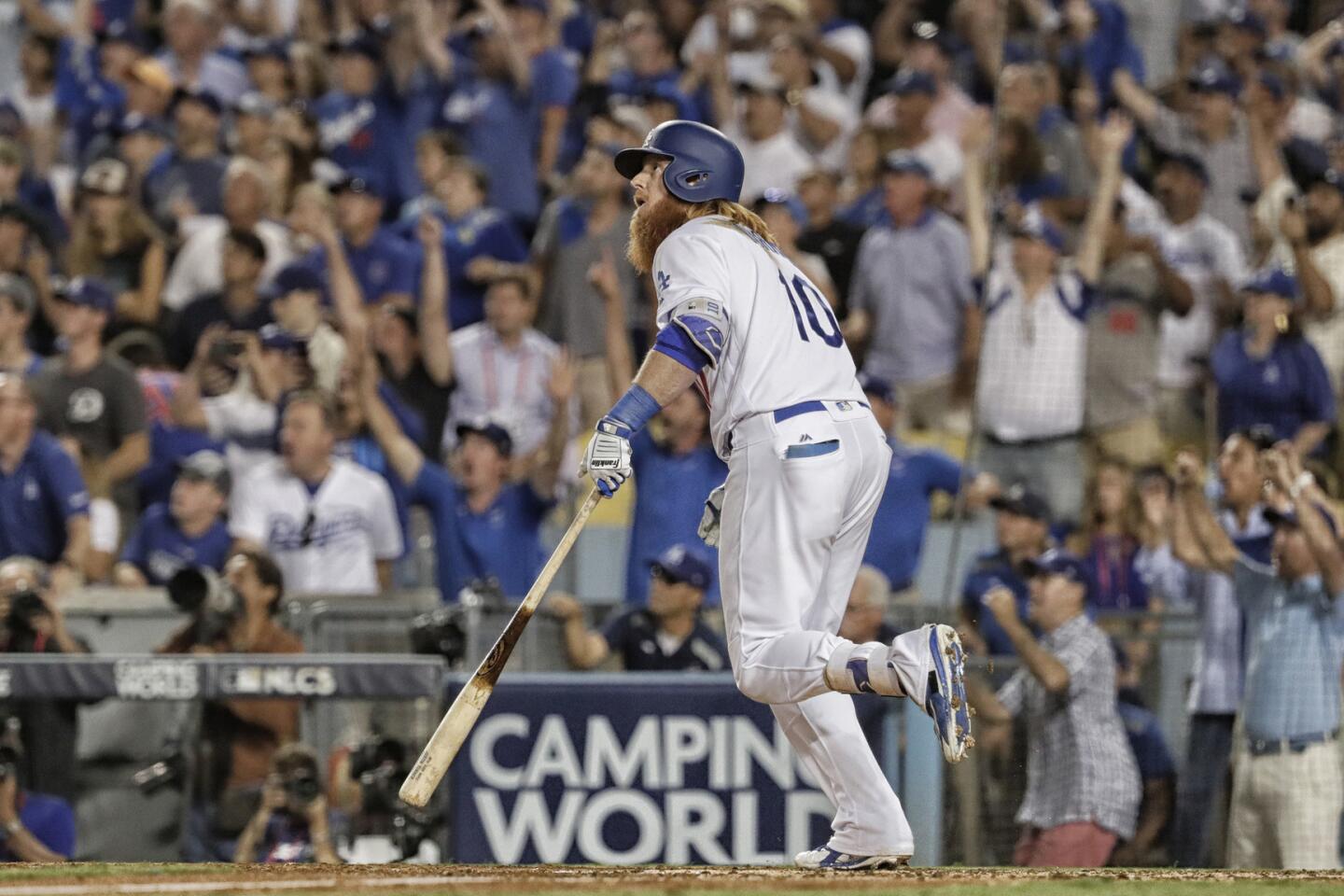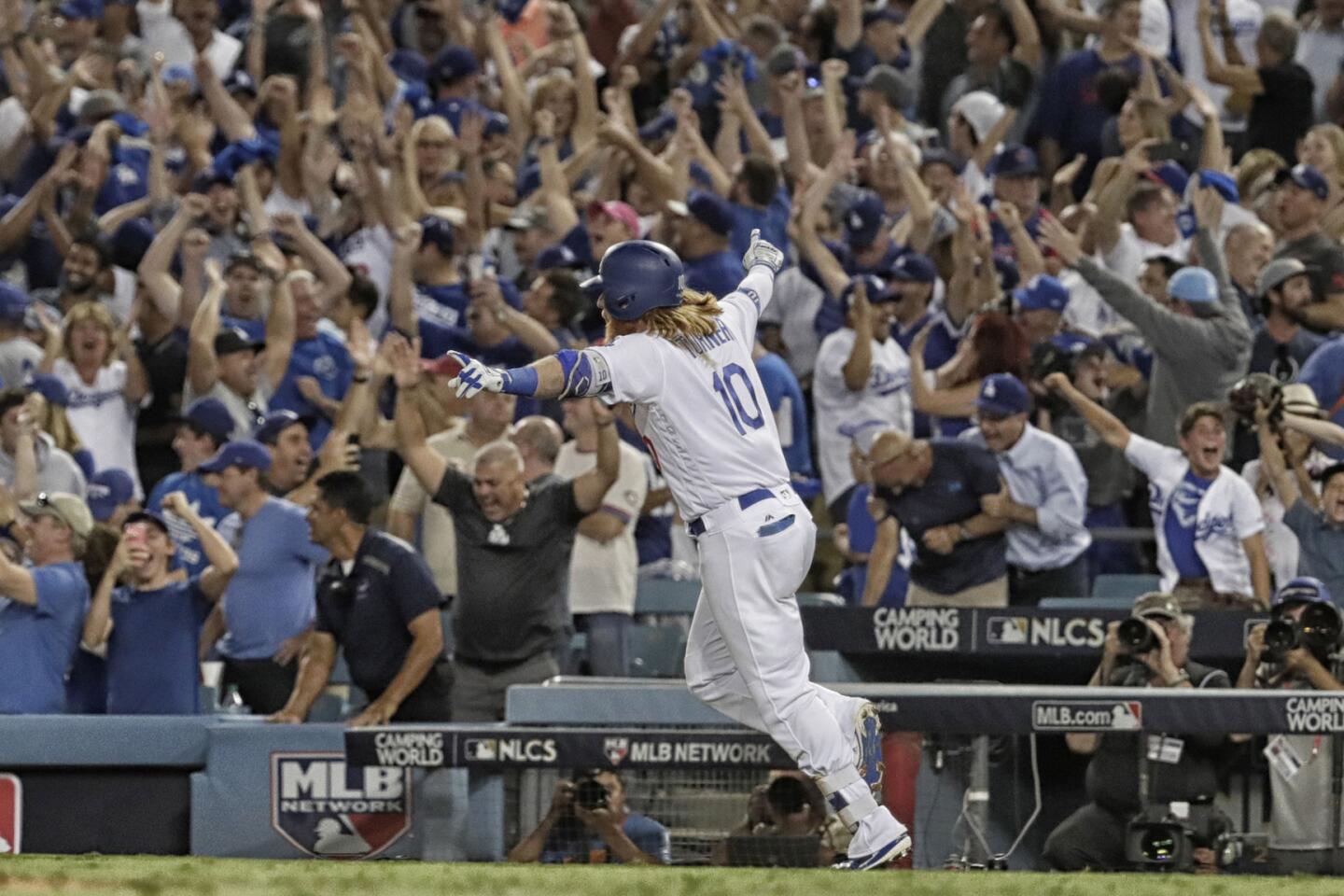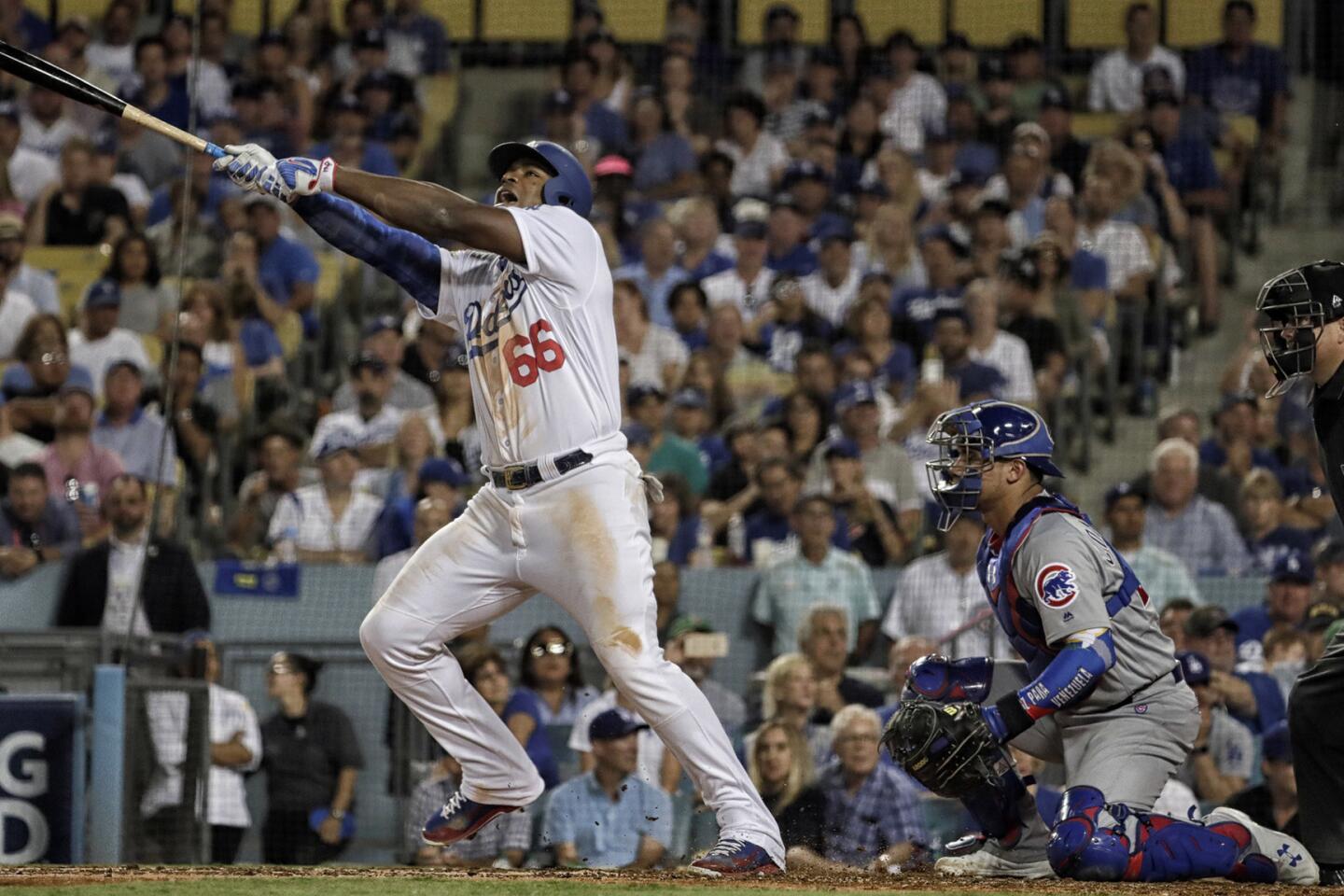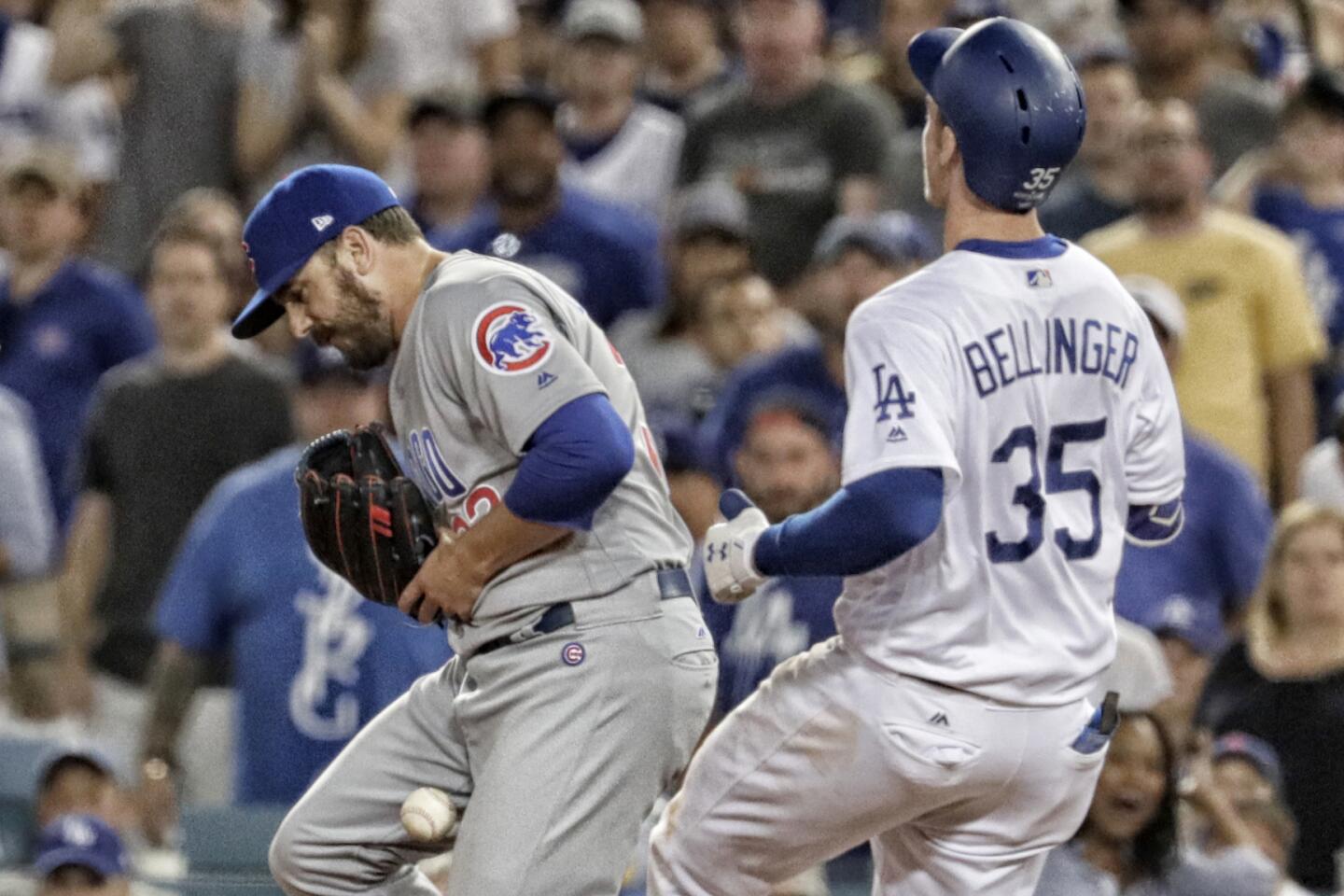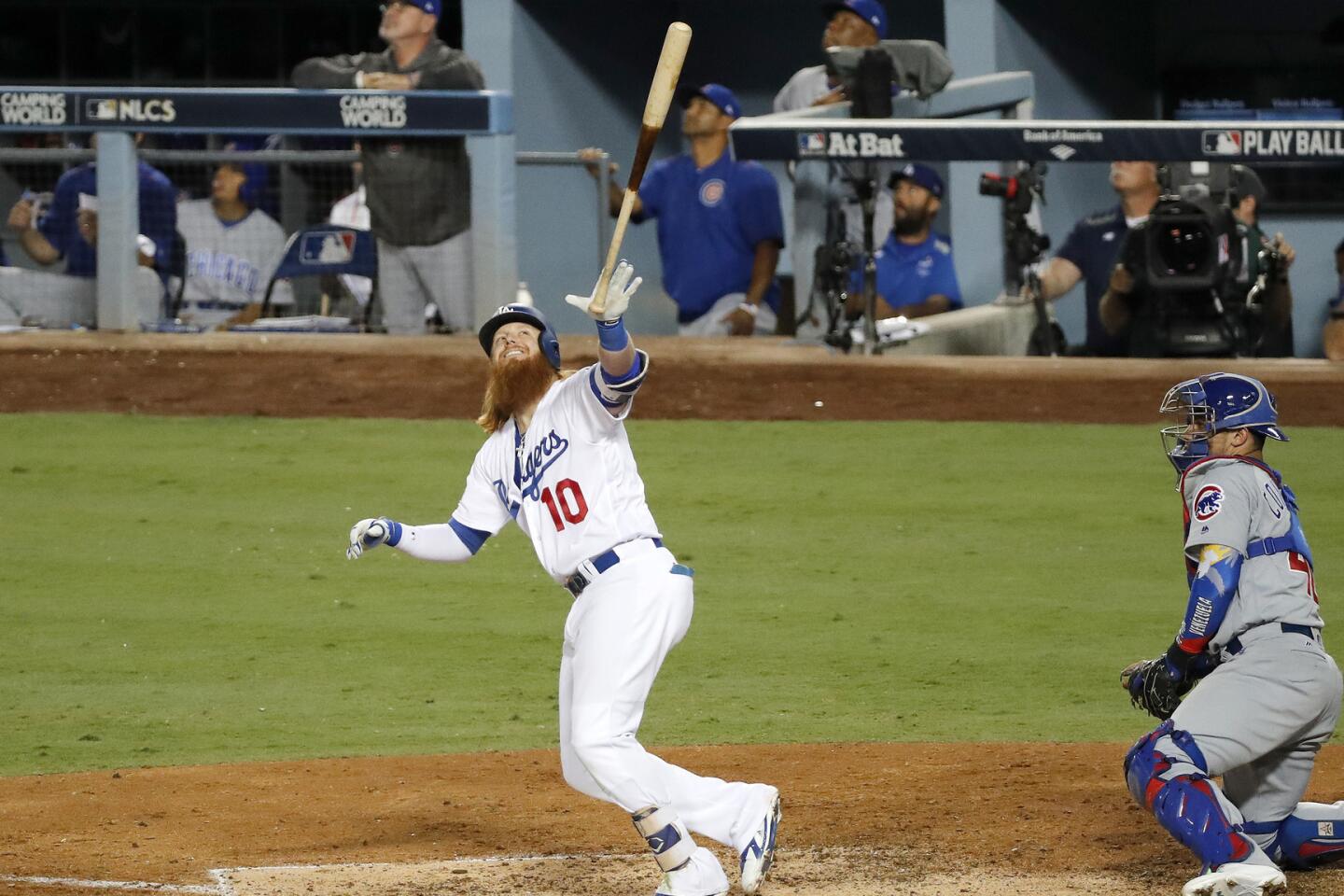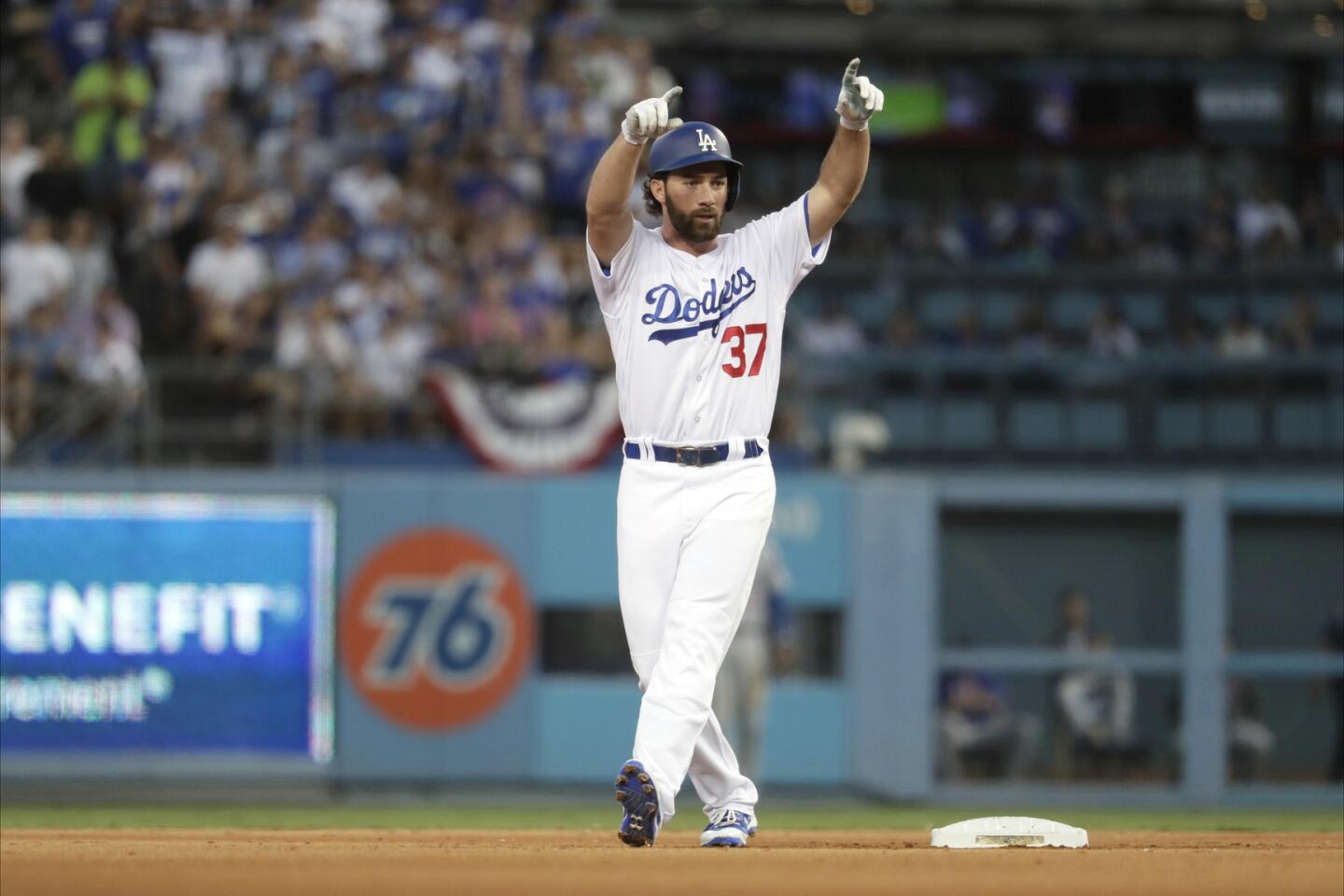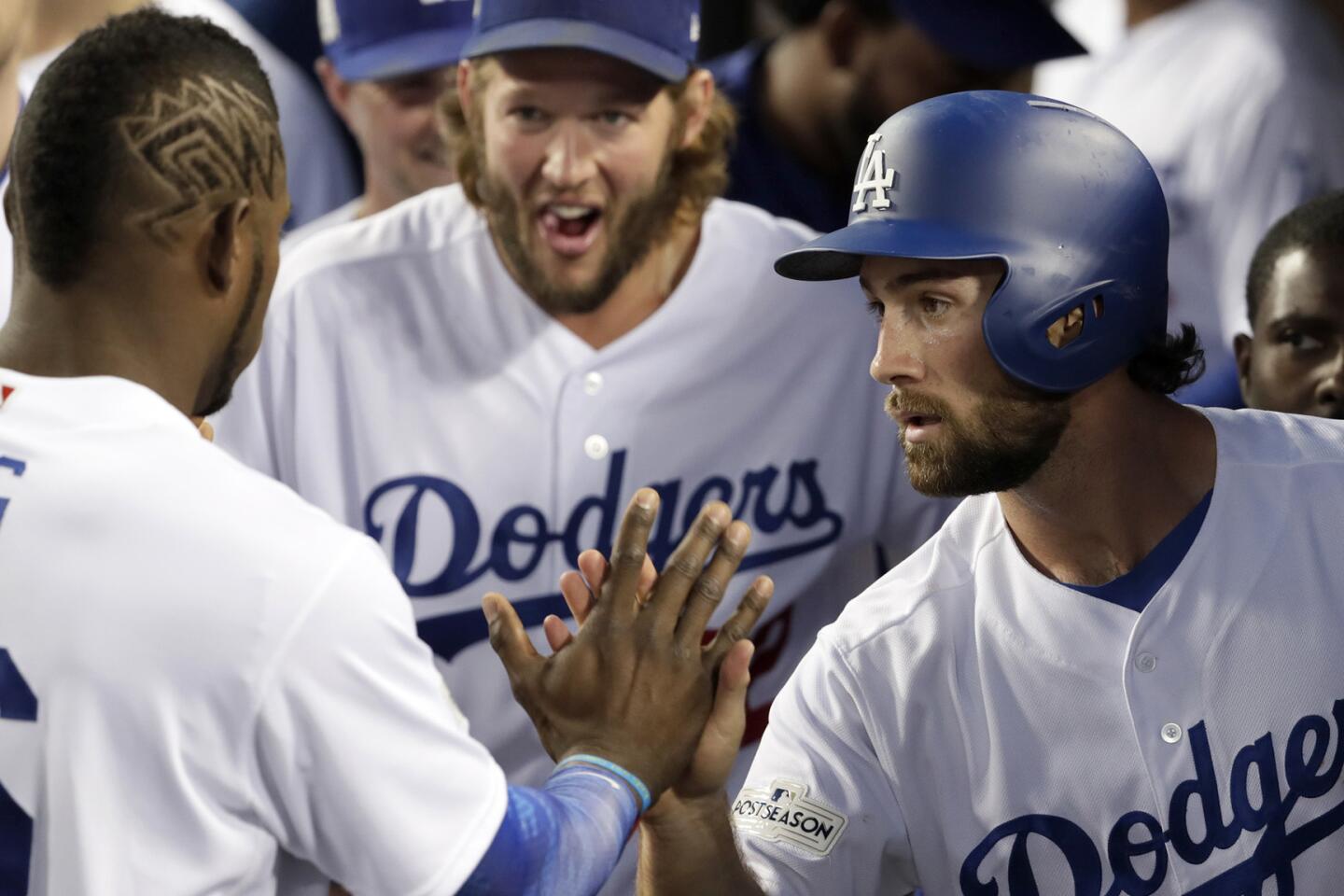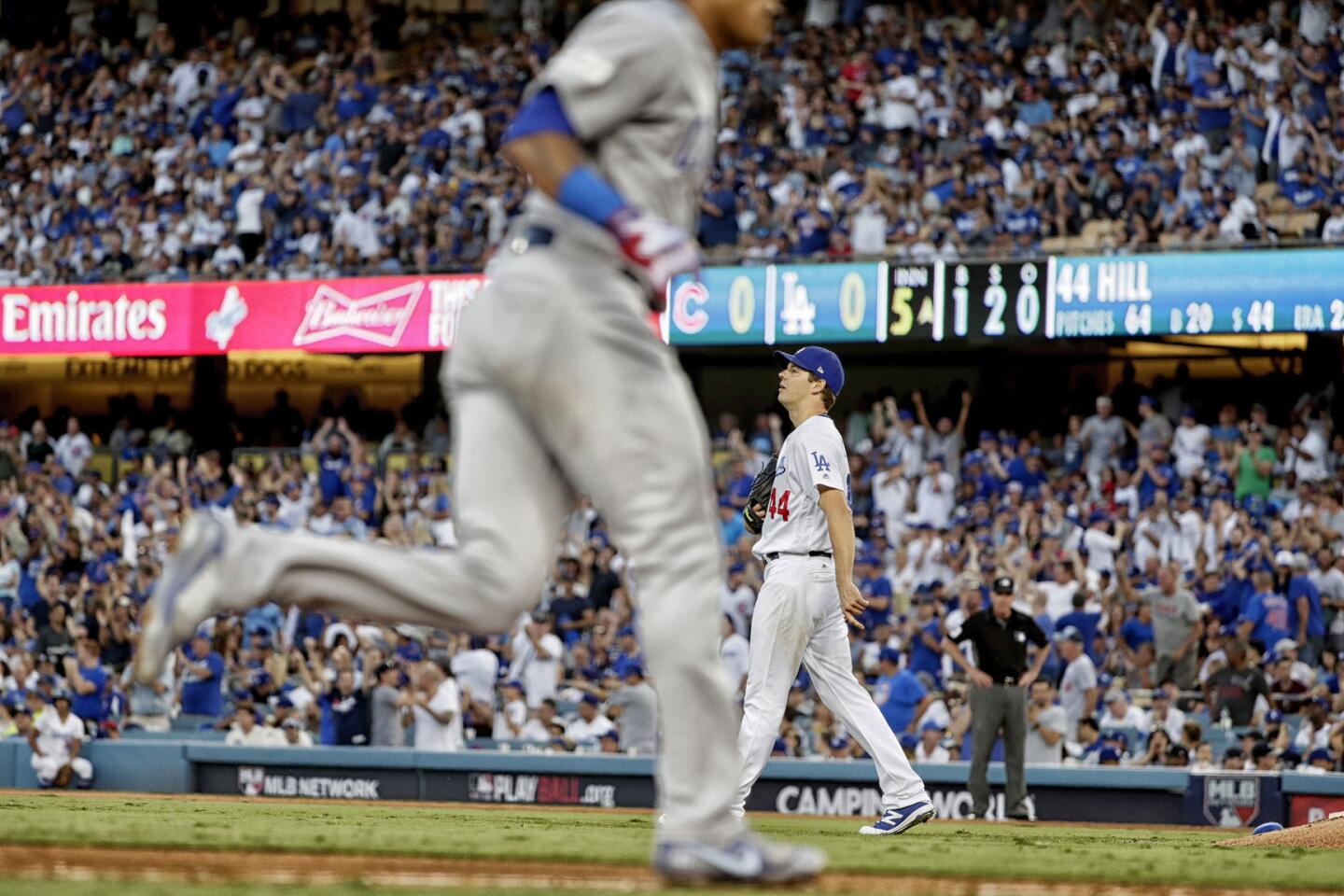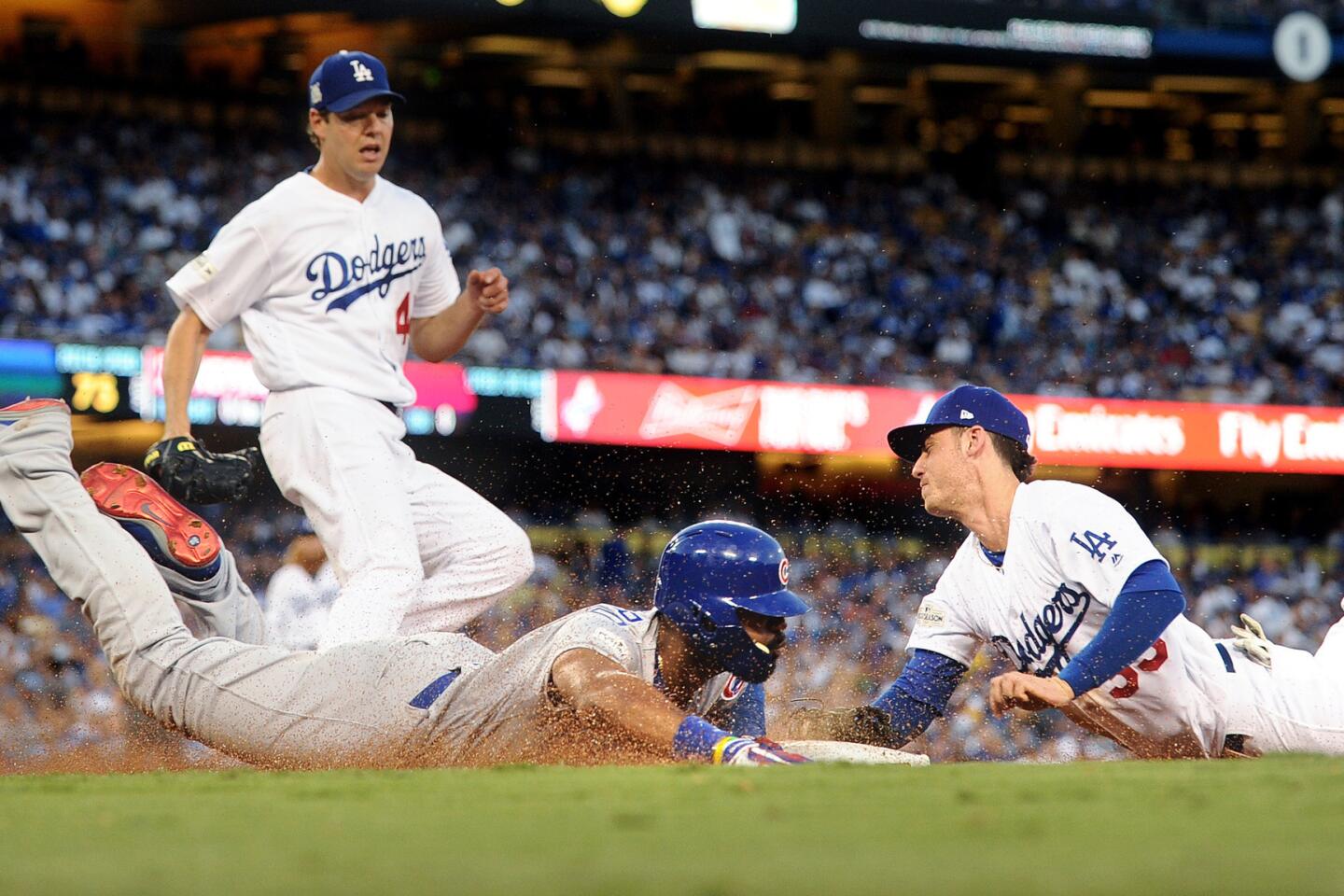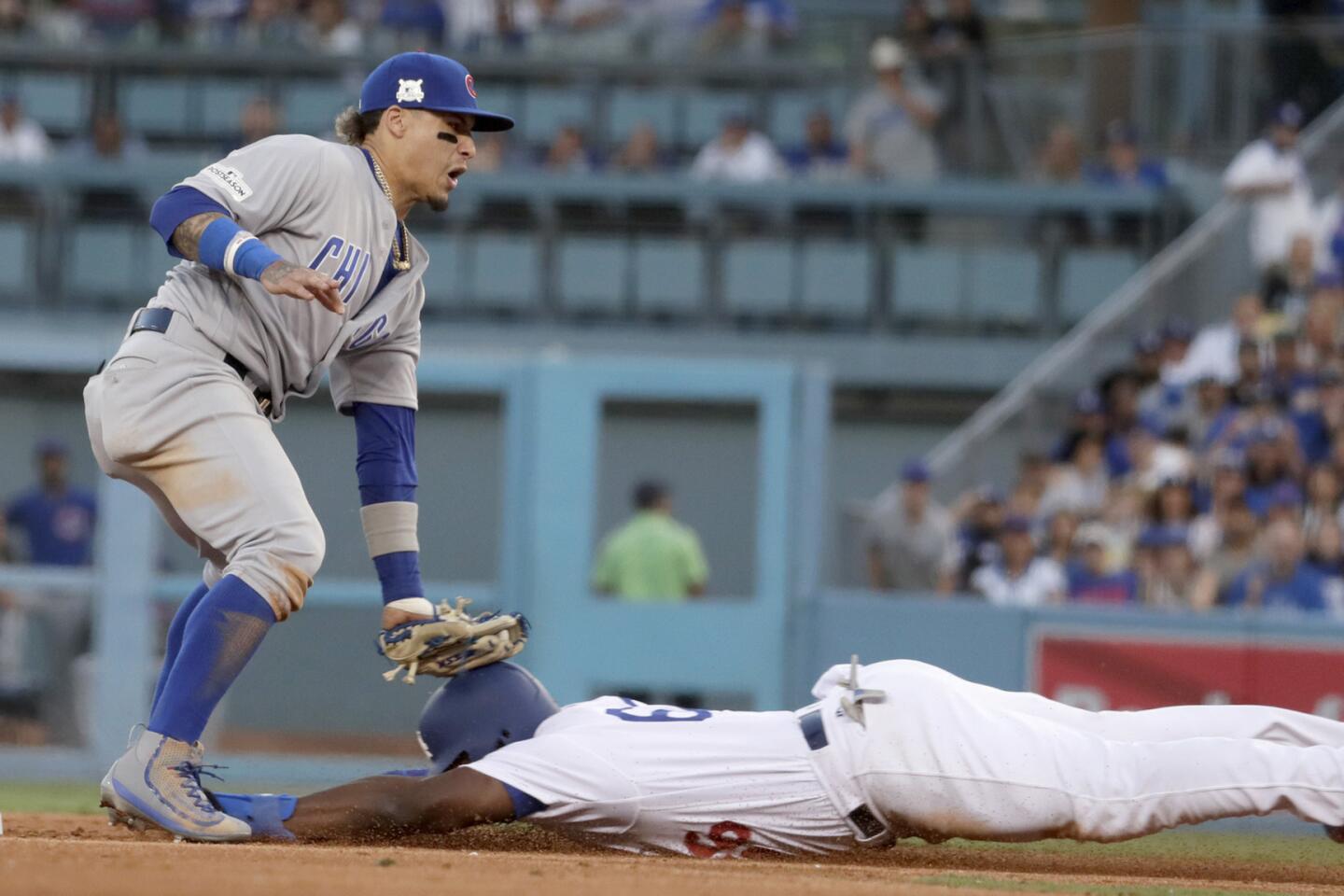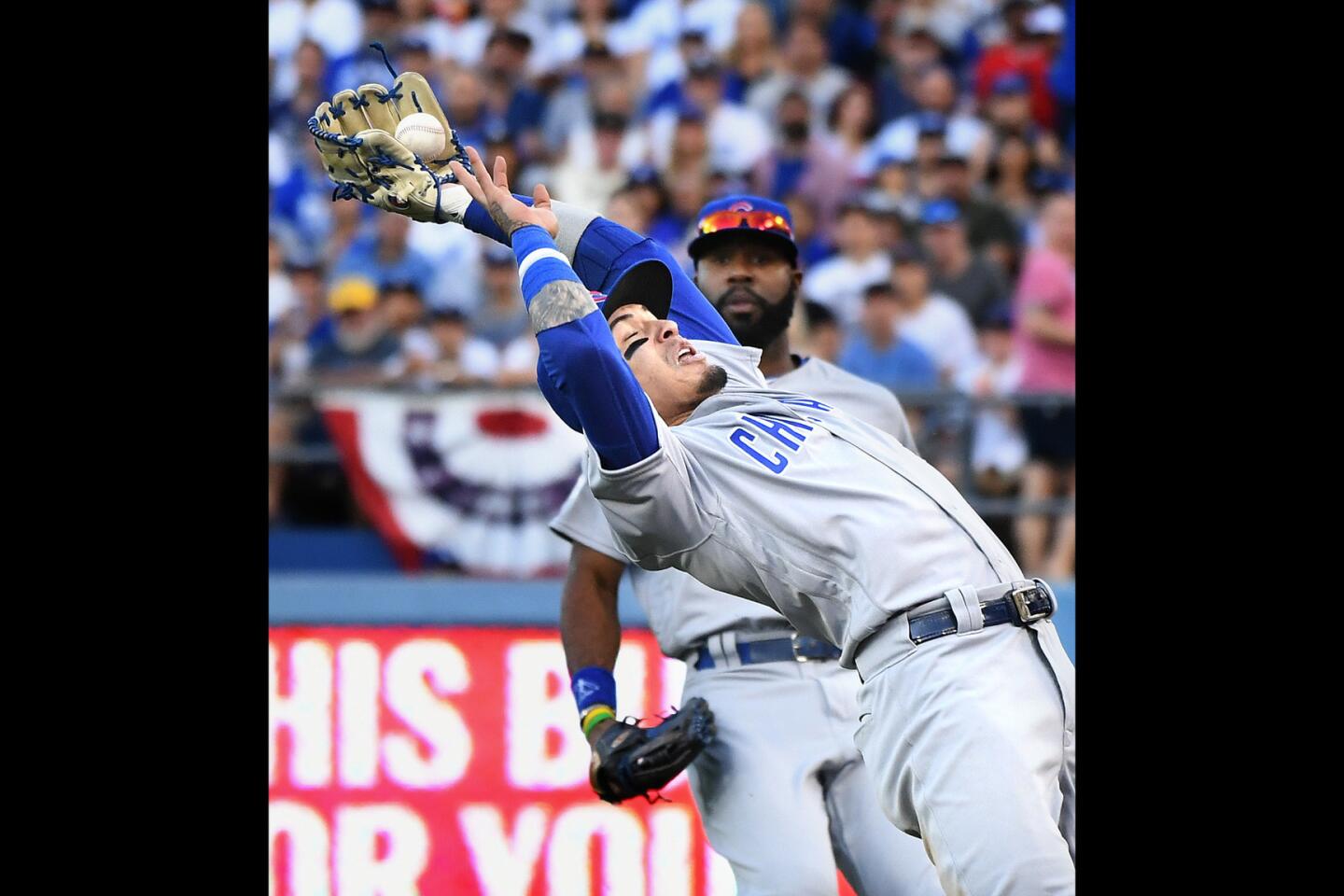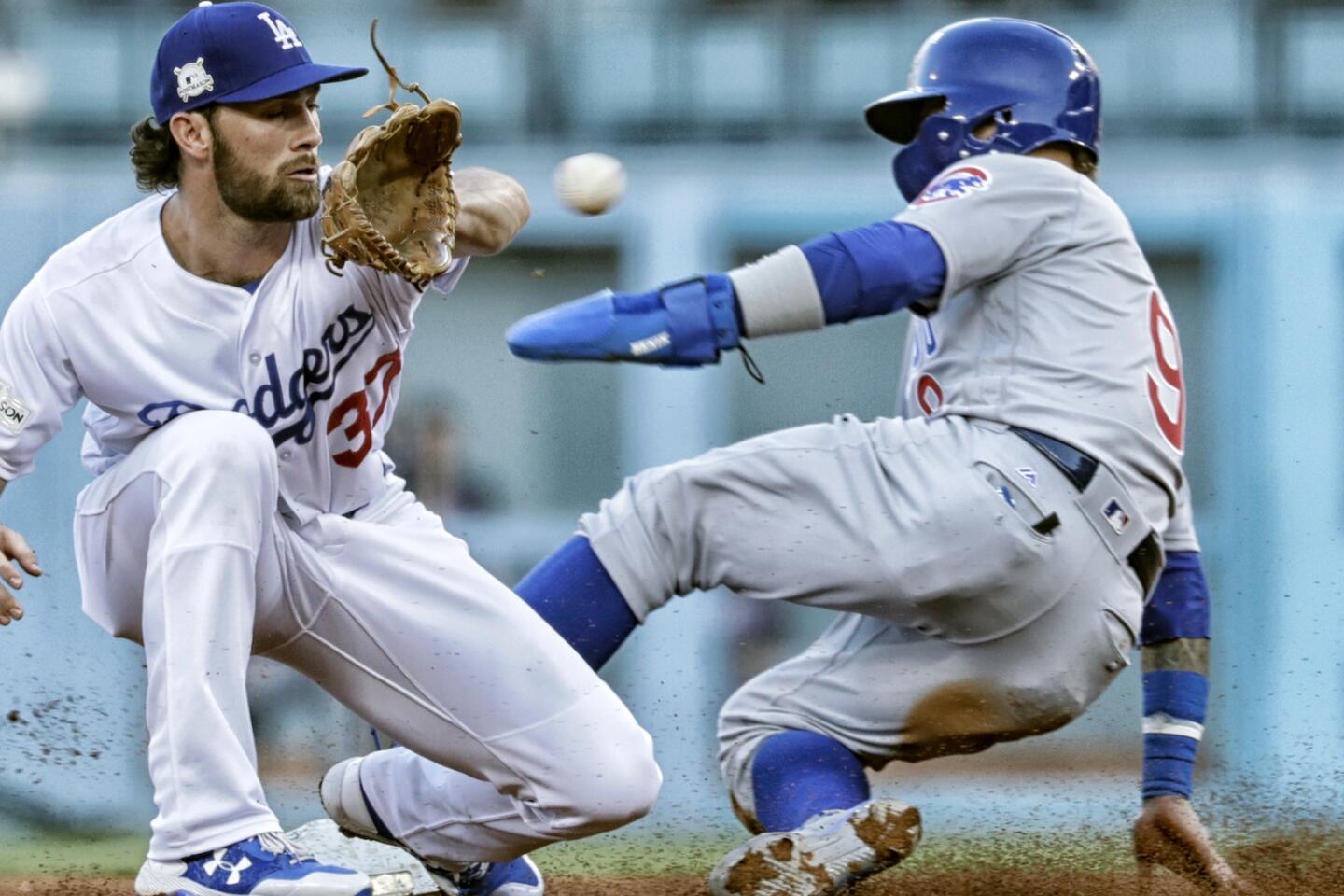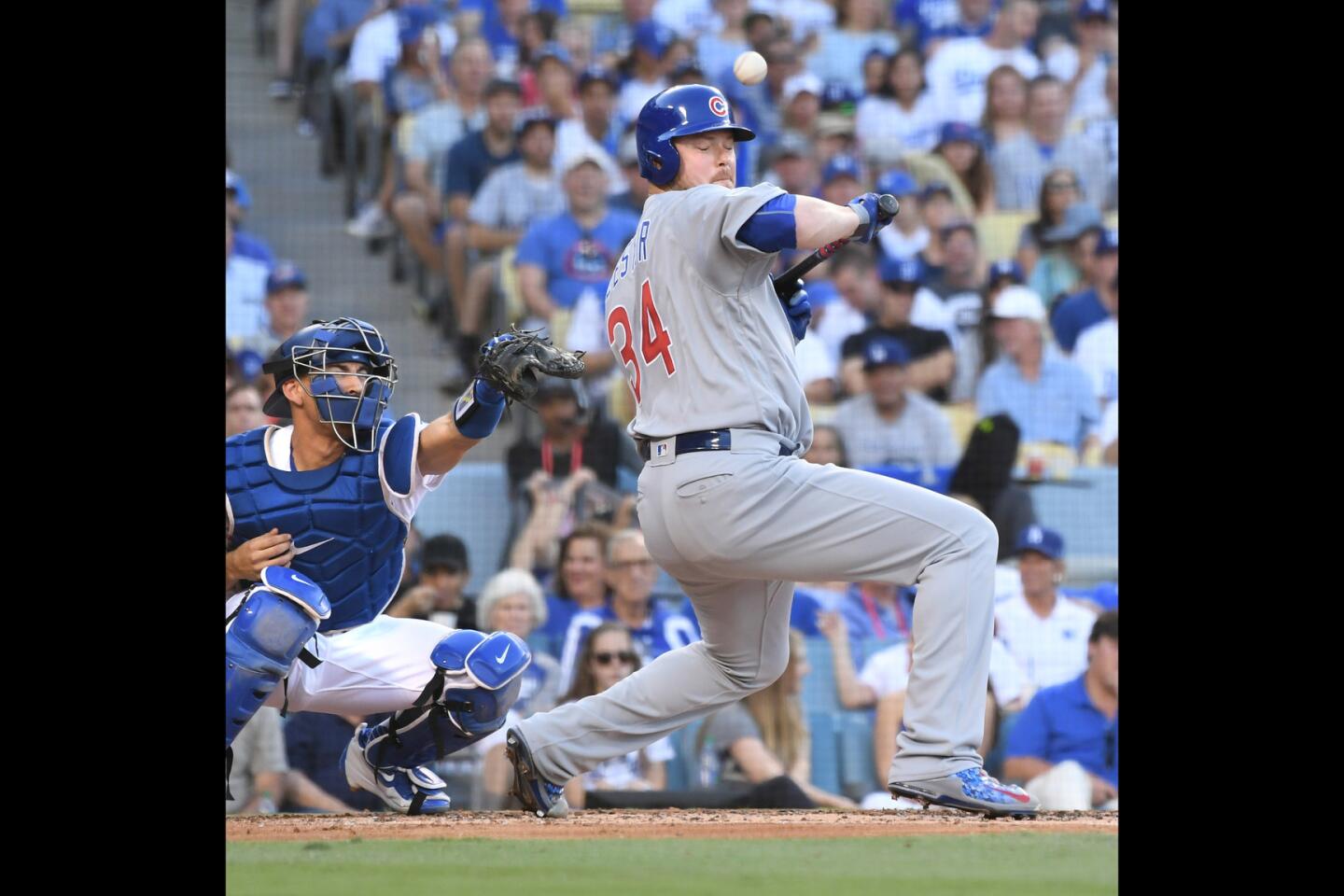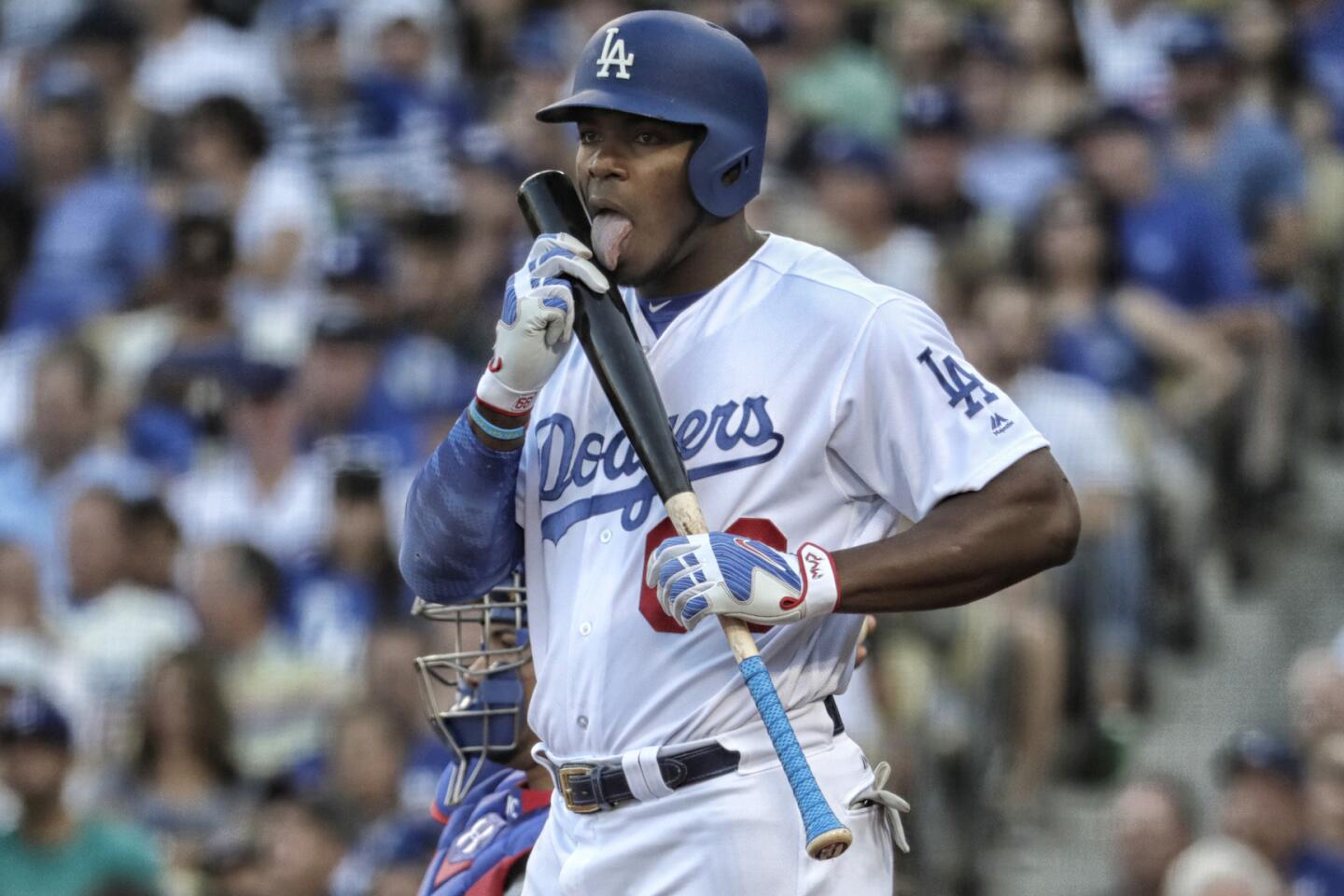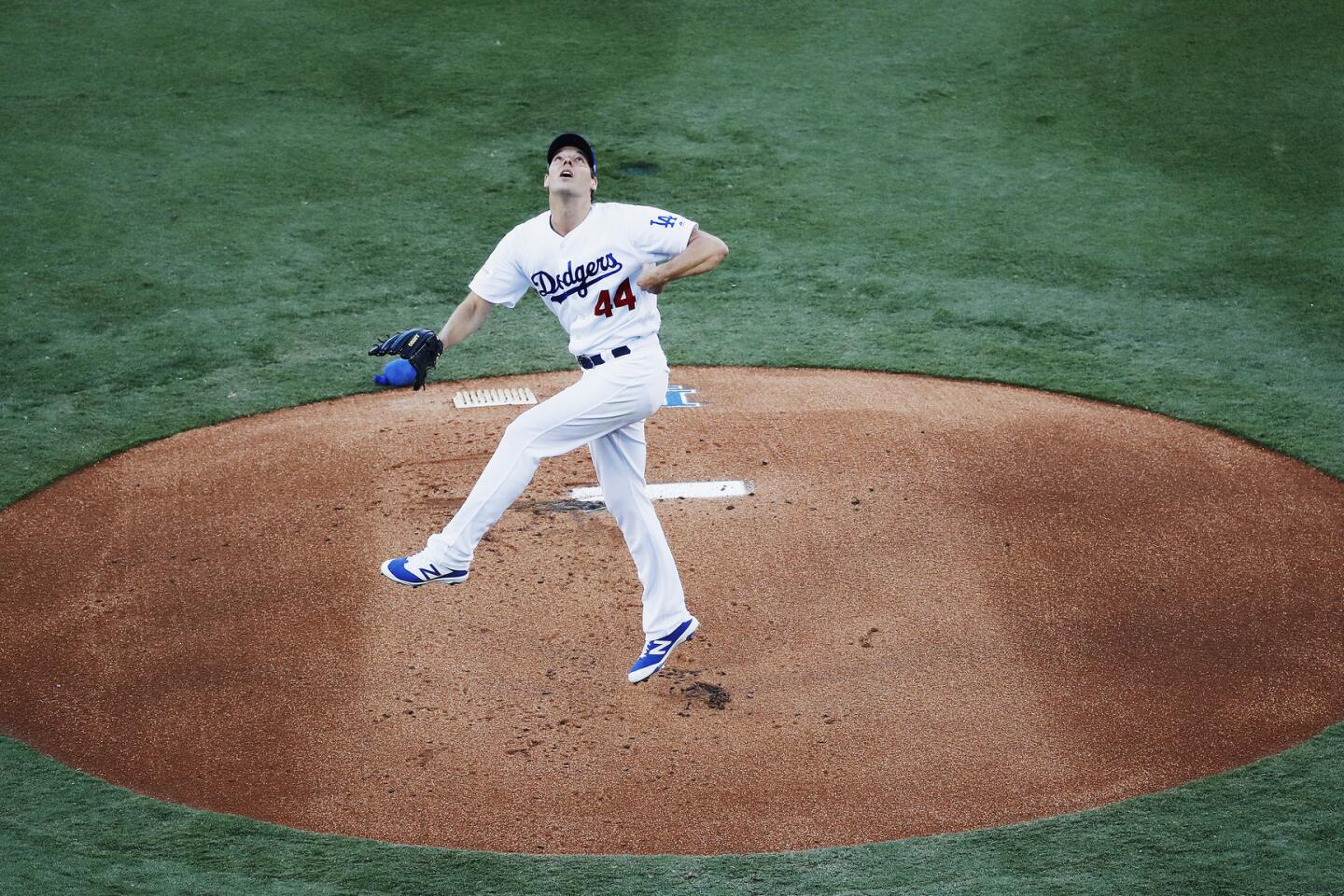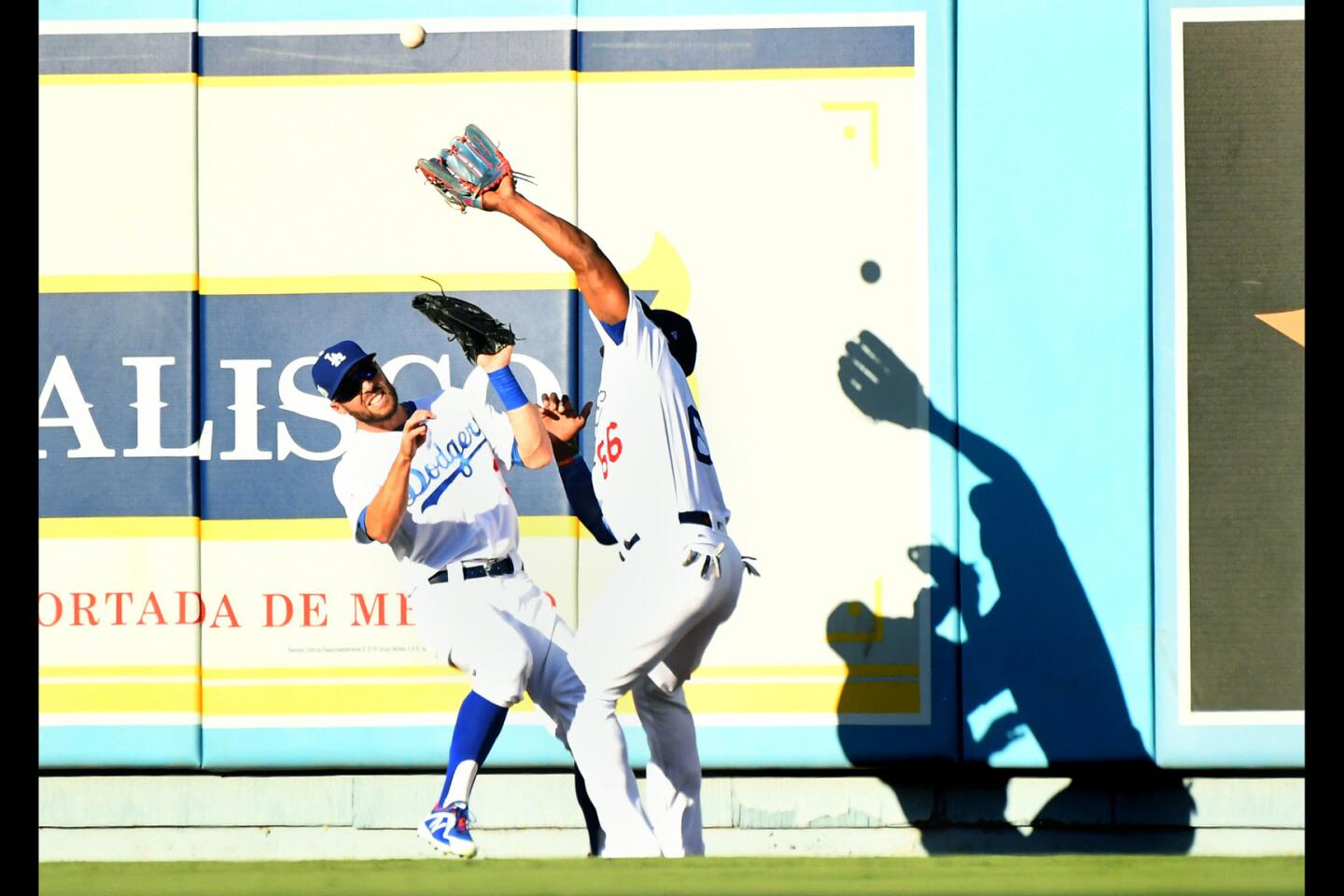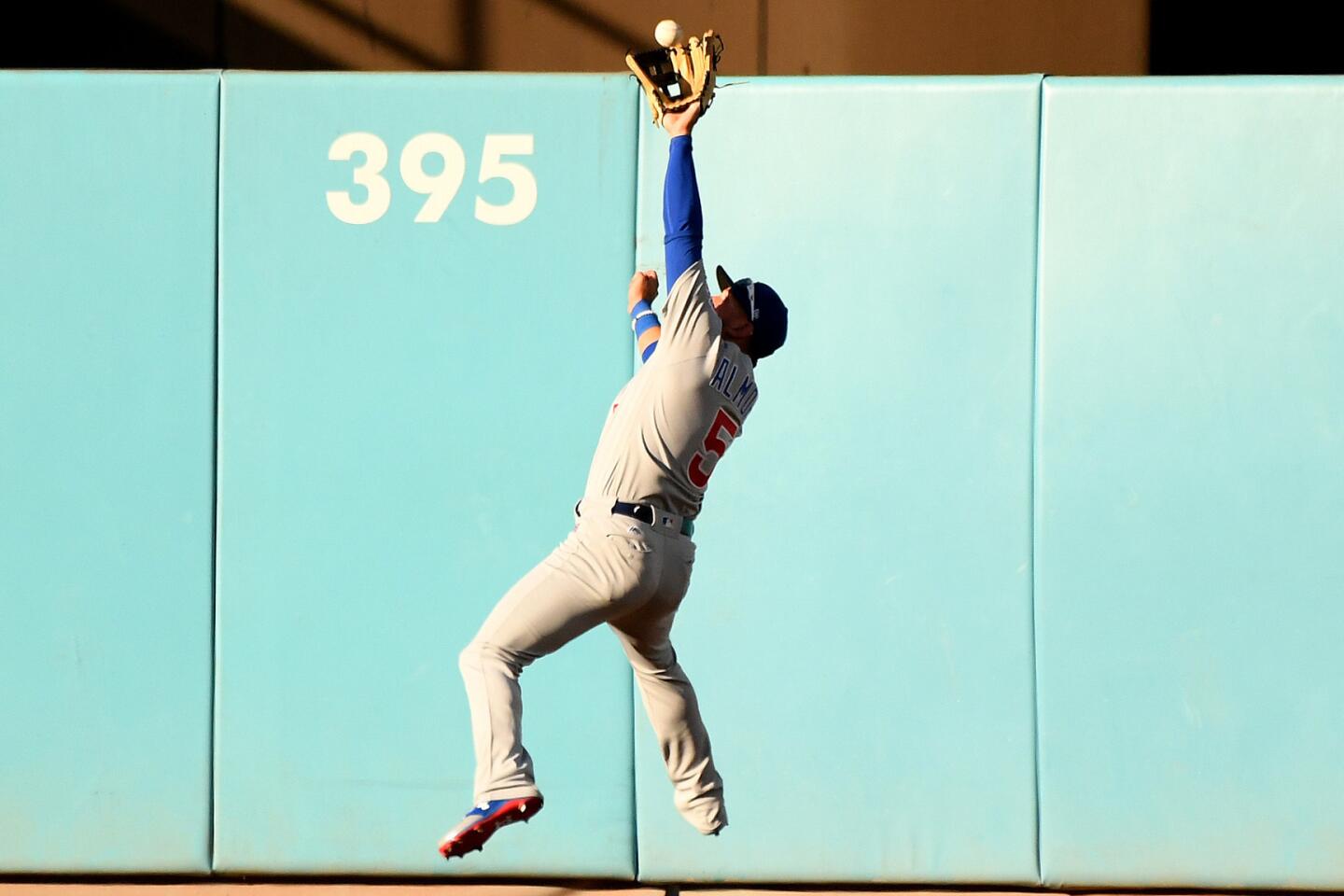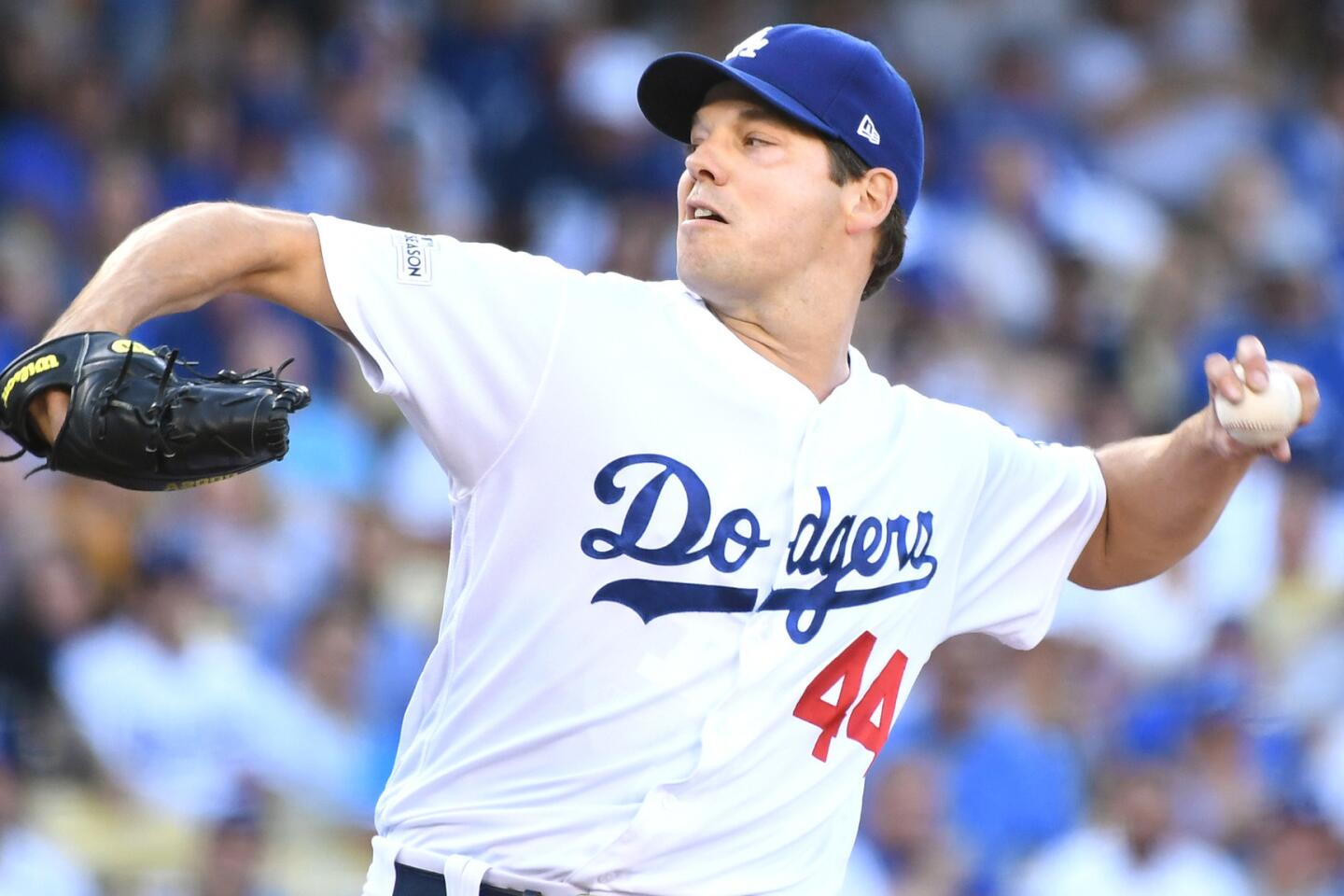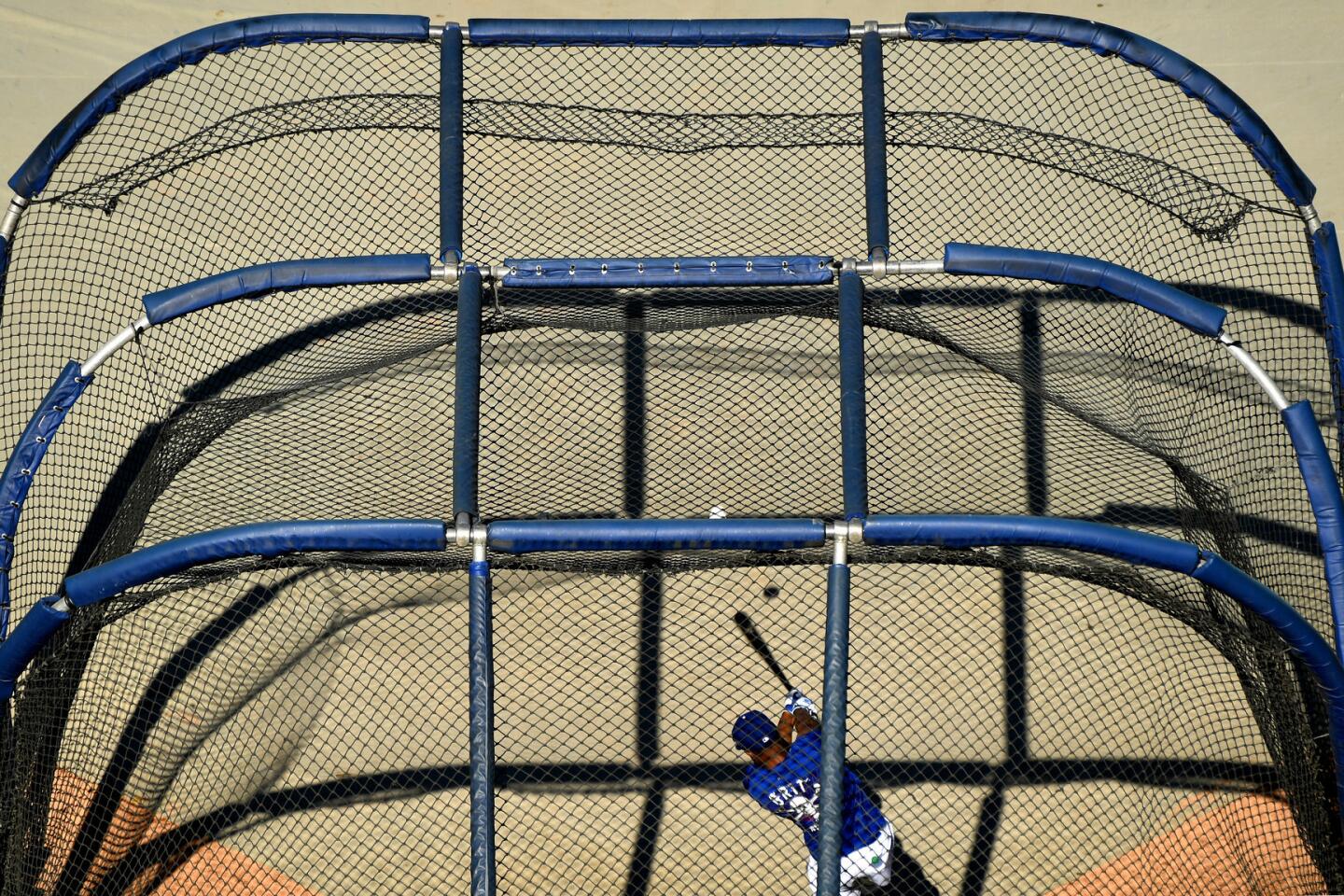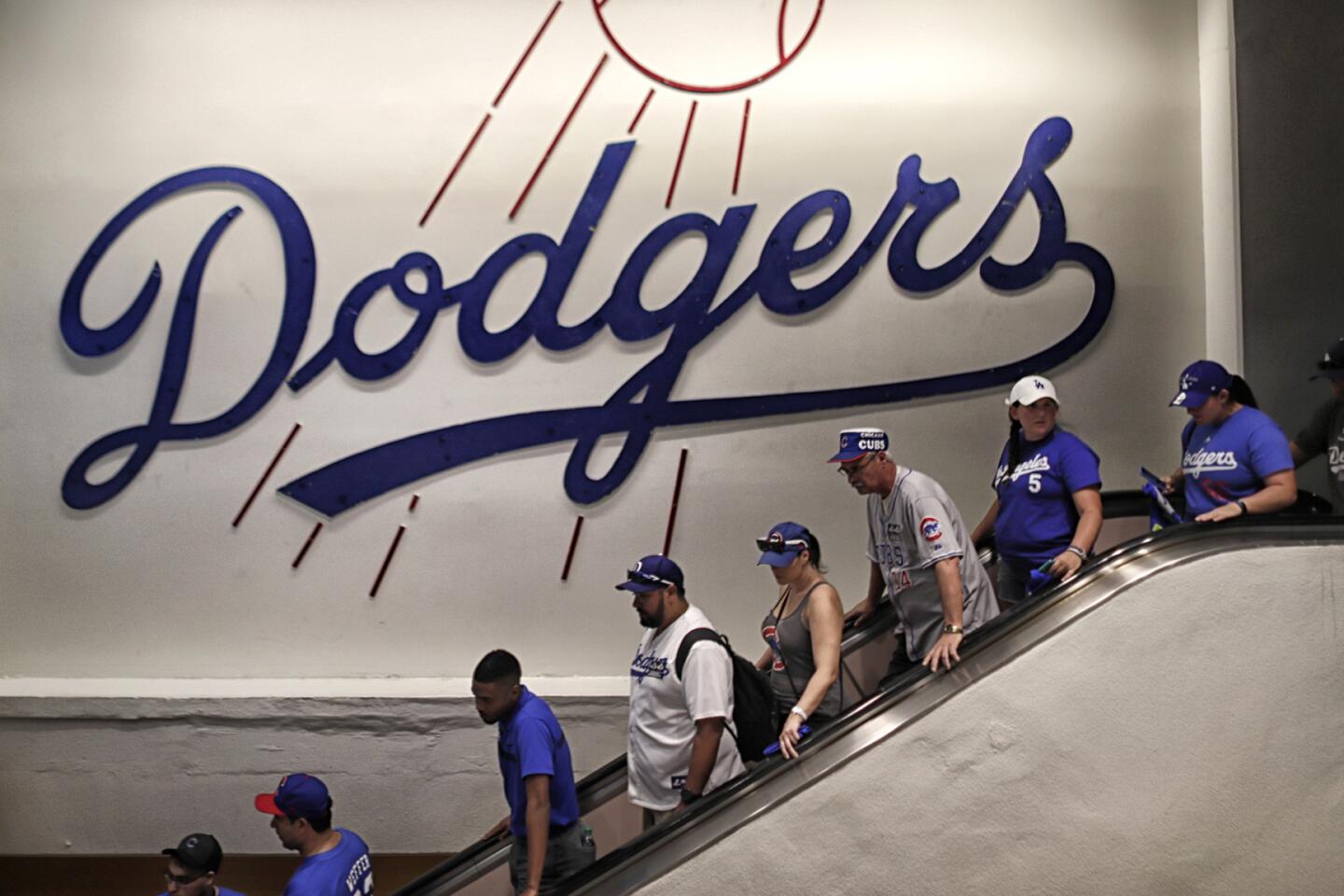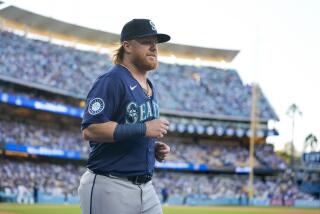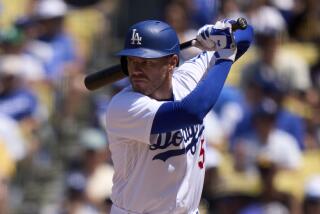Justin Turner’s walk-off home run gives Dodgers a 2-0 lead over Cubs in NLCS

On the 29th anniversary of Kirk Gibson’s walk-off blast, the Dodgers added another chapter to franchise lore when Justin Turner thundered a game-winning, three-run homer with two outs in the ninth inning to give the Dodgers a 4-1 victory in Game 2 o
- Share via
Justin Turner sank into his chair inside the Dodgers clubhouse and picked up his iPhone. Mere minutes after his game-winning, ballpark-rattling, three-run homer cleared the center-field fence, the aisles at Dodger Stadium still were packed, his auburn mane still was sticky from a postgame Gatorade shower, and his body still coursed with the adrenaline unleashed in the final moment of Sunday’s 4-1 victory over the Cubs in Game 2 of the National League Championship Series.
Turner could not sit still. There were 65 unread messages on his phone, and he expected more to flood it. He rose to greet a staffer who showed him a picture of the homer. He hugged Cole Roberts, the teenage son of the Dodgers’ manager. The younger Roberts declared it “the sickest thing ever.” Turner did not disagree.
“That,” Turner said, “was the coolest thing I’ve ever done in my baseball career.”
It was something this ballpark and this city had not seen in 29 years. On Oct. 15, 1988, Kirk Gibson pulled himself off the training table for a legacy-defining homer off of Oakland closer Dennis Eckersley. Sitting on a living room floor about 25 miles south of the ballpark, inside his grandmother’s house in Lakewood, a 3-year-old boy screamed as the baseball cleared the fence.
The boy grew up to be a baseball player, then a big-leaguer, then a Dodger, then the second Dodger to hit a walk-off playoff homer. On the 29th anniversary of Gibson’s home run, Turner recognized the symmetry as he rounded second base. He decided against mimicking Gibson’s famed fist pump. Instead he hollered at his teammates assembled at the plate, tossed his helmet into the grass and disappeared inside delirium of two dozen other Dodgers, a group two wins away from the World Series.
“I felt like I was floating,” Turner said.
The noise inside the stadium felt volcanic. The ballpark shook beneath the weight of 54,479 fans stamping on the bleachers and shouting toward the sky. Dave Roberts emerged from the scrum and urged the crowd to raise the decibel level. Yasiel Puig did the same. The crowd obliged — because this ballpark may not host another game for more than a week.
Owners of a 2-0 lead in this series, the Dodgers will fly to Chicago on Monday with an opportunity to close out the defending champions at Wrigley Field. Through 18 innings, the Dodgers have dined on the bullpen of the Cubs, a glaring weakness for an otherwise formidable opponent. On Sunday, the Cubs held firm until the bottom of the ninth, when veteran pitcher John Lackey fed Turner a 92-mph fastball at the belt, and Turner etched his name into franchise lore.
The moment underscored the strategic advantage Roberts holds over Cubs manager Joe Maddon, who chose Lackey over closer Wade Davis, who Maddon said was only available in a save situation. The situation never arose. Turner guaranteed that.
“That’s the guy we want up there,” catcher Austin Barnes said.
“He’s probably the most clutch player I’ve ever played with,” outfielder Chris Taylor said.
“J.T.,” Roberts said, “is that guy for us.”
Roberts relished the production from Turner, who helped the team forget about the absence of injured shortstop Corey Seager. As Turner starred, the Dodgers quieted the twin titans of the Cubs lineup, first baseman Anthony Rizzo and third baseman Kris Bryant. The duo is 1-for-14 through two games, and the Dodgers relievers have retired 24 of the 25 batters they’ve faced.
“What’s different about this team?” closer Kenley Jansen said. “The thing is, we all care about each other. It’s not about that one guy or this.”
The Dodgers relievers have played a role in that. On Sunday, Roberts opened his bullpen with glee. He removed Rich Hill after five innings, despite Hill allowing only three hits with eight strikeouts. Maddon turned to his relievers far earlier than he had hoped.
The Dodgers forced Cubs ace Jon Lester to depart after 4 2/3 innings, the shortest of his 21 postseason starts. Lester was pitching on three days of rest. The Cubs needed him to throw 55 pitches as a reliever in Game 4 of the first round. Lester logged 3 2/3 innings and did something he has only done twice since 2016: He picked a runner off.
For more than half a decade, Lester has battled a mental block that prevents him from throwing the baseball to first base. In last October’s NLCS, Dodgers tried to exploit this weakness, only to see it backfire. Joc Pederson lined up like a sprinter. Enrique Hernandez danced like a maniac. The players appeared more interested in shenanigans than stealing bases, and Lester permitted two runs in 13 innings as the Dodgers lost to Lester twice.
Roberts expected fewer theatrics on Sunday. Unlike 2016, his lineup was not anemic against left-handed pitchers. He trusted his players to practice patience and drive up Lester’s pitch count.
“They don’t want to get into their ‘pen,” Roberts said before the game. “They want to stay away from it as long as they can.”
Roberts lacked that fear about his own relievers. But he hoped for Hill to go deep into the game. Hill bent first. In the fifth, Chicago shortstop Addison Russell swung late at a pair of fastballs, lifting them foul along the first-base side. He found his timing on a 1-2 fastball that bisected the plate. Russell hooked a drive between the foul pole and the bullpen for a solo home run.
Hill would not return for the sixth. After he got through the fifth, he left the dugout with Roberts. His spot was due up second in the batting order, and Curtis Granderson entered the on-deck circle. Furious at the misplaced fastball to Russell, Hill flung a cup of water at the bench. “That was the frustration,” Hill said.
Hill stewed next to pitching coach Rick Honeycutt as the Dodgers tied the game. The rally started with Charlie Culberson’s leadoff double. Three batters later, Turner threaded a two-out single off Lester through the right side of the infield to bring Culberson home.
The bullpens would decide the game. The two relief corps traded zeros until the ninth. Maddon sent left-handed reliever Brian Duensing back to the mound to start the inning. Puig took a four-pitch walk and Culberson bunted him to second base. Maddon decided Lackey, a 38-year-old sage with a 4.59 earned-run average in 2017, could put out the blaze.
Lackey walked Taylor. Turner swept the dirt out of the batter’s box as he stepped in. Lackey fired a cutter in the dirt. Turner poised himself as a 1-0 fastball hummed over the plate. He unloaded on the pitch and waited to see where it would fall.
The baseball landed in the glove of a fan on the furthest edge of the left-field pavilion. Turner spread his arms wide. The ballpark started to reel. His teammates crowded the plate. The party was on.
“I can’t even put it into words right now,” Turner said. “It’s incredible.”
After the game, Turner took a break from his reverie to negotiate with the fan who caught the baseball. The fan informed Turner how much it meant to catch the home run. Turner said the ball meant something to him, too. He passed along his number and told the fan to provide him with a wishlist. Turner got the baseball.
As he finished up his postgame press conference, Turner returned to the field for an interview with a television network. He answered questions as a few stray fans called his name from the concourse. They spoke the words that resonated on a night 29 years in the making.
“Clutch, baby!”
“Clutch!”
“World Series! World Series!”
Twitter: @McCulloughTimes
More to Read
Are you a true-blue fan?
Get our Dodgers Dugout newsletter for insights, news and much more.
You may occasionally receive promotional content from the Los Angeles Times.
